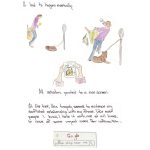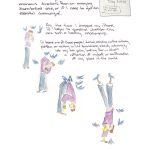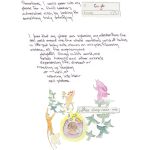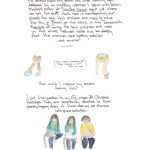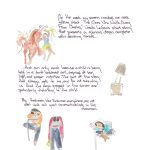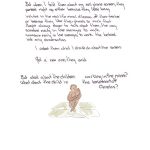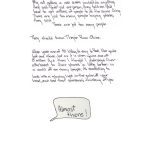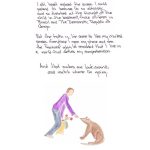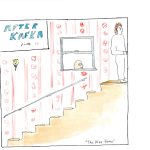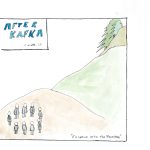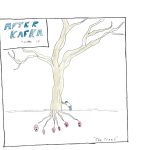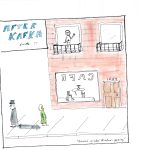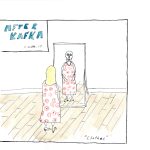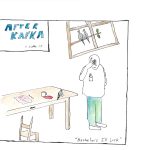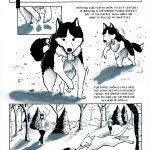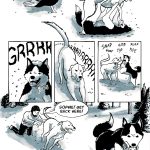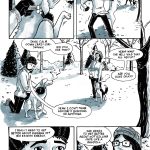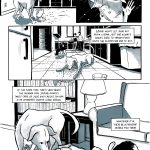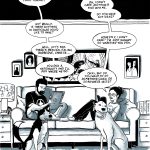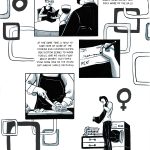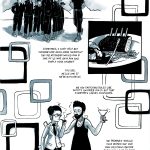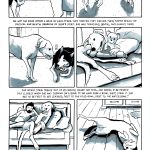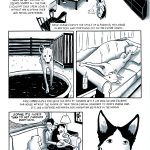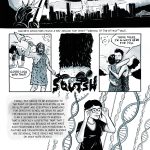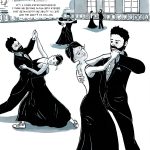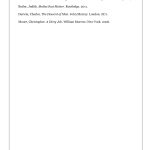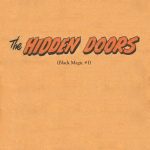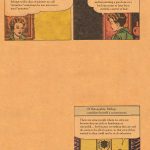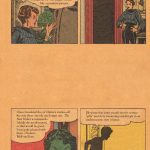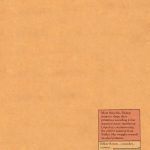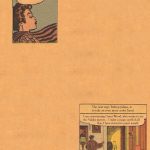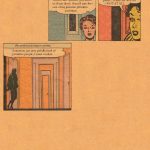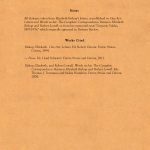Category: Literary Features
Vanity
Hairpins on the vanity—
I’ve lost count.
Fellow suburbanites,
the pedestrians outpace the growing
traffic, hair hovers above cul-de-sacs
like tentacles. Go out,
get stung. Letting the touching
do its work, I venture into
wires. I feel like a lover.
I feel sorry that sex
rarely happens in public.
Not that I’d be looking for it,
only stumble upon a couple
of fellow loners trying
to prove to their neighbors
they aren’t lonely.
No other way to convince
the jury, unless
a man grabs a gun
to blast billions of bullets,
and satisfies himself
that he can live without
Homo sapiens.
Nearby, imperious crows line up
on power lines. Momentary silence
before their firing squad of gazes—
spare me—I’ll return home—
the hair—accidental curios
The Devil in Your Pants
Lying in my sleeping bag, I thought of three things: black eyes, round asses, and God. The boys from my youth group were stuffed in the storage room of a Protestant church. The girls were isolated down the hall. Sleep was impossible, but on the first night of our divine mission my restlessness was given a reprieve. Our leader, Geri, burst in screeching with an issue of Cosmo squashed in her fist.
Geri had to have been in her early twenties, but to us kids, she carried all the wisdom of the Lord. She routinely searched our belongings, and one of the girls had been cavalier enough to buy a secular—satanic—magazine at a pit stop on our bus ride from Sarasota to Miami. The girl cried outside in the hall.
“I want to send her home,” Geri said, “but it’s too late for that.” Her eyes welled up. “We’re here for a very important reason. We can’t let anything separate us from God. We’re here for Him.”
Geri had little breakdowns like that all the time. She’d shed tears for us kids whenever she smoked a cigarette: “I know with every puff Jesus suffers longer.”
I made sure I wasn’t exposing myself and walked over to her. “You would really send her back?”
She put her hand on my shoulder. This aroused me. As much as I was afraid of her, she gave me more attention than any of the girls in my middle school.
“Yes, Brett.” Her hair was messy and gold. “Don’t you realize the promise we made?”
Oh, I made a promise all right. I promised to give up everything for God: my possessions, dreams, thoughts—my goddamn identity. I was part of something larger than myself, or some bullshit like that. In order to finance the ugly school bus we took from Sarasota to Miami, I spent all summer mowing yards and raking leaves. I had entered a black hole for Jesus, and I was charged with saving pagan souls from it. That was our mission.
“I’ll pray this doesn’t happen again,” she said.
Everyone thanked her, not knowing what else to do, and then we returned to our polyester masturbation tombs. I wrapped up tight, touching my groin, but not loud enough for anyone to hear. The thick sleeping bag warmed my twig and acorns. Closing my eyes, I tugged my member and thought of Geri, but my rodeo was silent. I’d learned another kind of stealth at school. To prevent a fist from crashing into the back of my head, I studied my tormentors’ routines, let them walk down the hall before I did. I used the bathroom during class instead of on breaks to keep my head out of the toilet. I was a ninja at avoiding bullies, just not defending myself from them.
This was why I made my promise to Jesus. I would save souls in exchange for him saving me. Geri had seemed a strange instrument for his salvation, but I attempted not to question God. As long as the beatings stopped, the Lord could ferry Daffy Duck down from heaven to save me.
The next day we met the Miami pastor. He bounced in his chair and yanked tiny, green things from his beard. “I was a pimp,” he began. “I sold women. I sold myself. I worked as an enforcer sometimes.” He shook his head. “It’s not pleasant, hurting people.” After wrenching himself from the chair, he trudged back and forth and told us the tale of how he found Jesus.
“My wife and I were watching TV. The Preacher opened our hearts. Now I live for God.”
That’s right. A televangelist convinced him to love Jesus (and give up his money). This seemed completely normal to me at the time. God works in mysterious ways, they said. I worked all summer, so I could be shipped to Miami and sleep on the floor of a church whose pastor was a pimp.
This pimp was a hell of lot preferable to my best friend back home. A few months prior my best friend had punched me in the face during a laser light show. I disagreed with him about music, and so I lost the skin under my eyes. It was minor compared to what I was accustomed to, so I still slept over at his place that weekend. At least he didn’t beat me up all the time.
After the pastor finished, we handed out pamphlets in neighborhoods with windows shielded by iron bars. People either cussed us out or shared their mutual love of Jesus–ultimately accomplishing nothing. It was either A) “I love Jesus TOO” or B) “Fuck off, children.”
There was one miracle, however. Geri wore tiny little silk shorts that showed off her pumpkin-sized booty. It was that day I discovered my sexual orientation: big-booty-o-sexual. I wasn’t Catholic, but my personal Protestantism had its only holy trinity: the father, the son, and Sir-Mix-a-Lot.
Geri turned to me. “We’re saving a lot of lives today, Brett.”
“No one’s really changed their mind.”
She gripped my wrists. “God knows what he’s doing.”
I nodded. Her words calmed me, and I really believed them. God was looking down on us, admiring his chosen instruments doing his work. And how could I not be spellbound by this delusion? It was a relief to be away from the kids back home dragging me across the baseball field by the legs. No one flicked my ears from the desk behind me. No one sucker-punched me for my lunch money. I didn’t have to endure a room full of kids laughing at my gym attire because someone broke into my locker during P.E. and stole my clothes. Sure, people slammed their doors in our faces, but it was heavenly compared to physical assault. If following Geri’s bouncing cinnamon buns under the light of God wasn’t deliverance, I didn’t know what was.
After wasting paper all day, our traveling circus lingered at a basketball court. Geri was still riled up like a crack fiend, but our other youth group leader, a self-important prick named Chuck, decided we needed a rest. Unlike Geri, Chuck had no redeeming qualities. Unless you count being old and rich as redeeming. He never let up on me. Every night, he barked at me about my untidy sleeping bag or lectured me about the evils of loose women and The Simpsons. His favorite topic of conversation was about how much money he donated to our church back home. “Kept it alive,” he said.
On the court, a boy rimmed out a shot and said, “Shit.” Chuck whispered “Shoot” to make sure our ears hadn’t been soiled, which made me want to shout “Eat a dick” into his tender lobes. Instead I read through the pamphlet for the twentieth time. The kid cursed again, and Chuck shook his head like he just heard about a baby getting run over by a truck.
On the way back to the labor camp, we passed a voodoo shop. Well, in retrospect it was probably just a store that sold bongs and Ouija boards, but Chuck and Geri steered us away from it like it was Satan’s private sex dungeon. I broke rank and ran over to it.
“Brett, stop. It’s too dangerous,” Chuck cried.
I didn’t look back. I’d made no progress knocking on doors, and if I could save just one soul from the fiery pits of hell, I’d march right into the heart of the devil’s ballsack, and all the schoolyard beatings would be worth it. Chuck could swallow his words along with his fluffy mustache for all I cared. I marched into the shop and tossed the pamphlet on the counter in front of the clerk.
The guy behind the counter eyeballed it, and then he winced at me for a few seconds before hissing, “Out… OUT.”
Back at the church, Geri, Chuck, and the pastor went at me three-on-one.
“You need to listen when we tell you not to do something,” said Chuck.
“This isn’t why we came here,” said Geri.
The pastor quivered, his face paling. “There are some places too dangerous to go, son. Demons stalk their walls.”
I looked at Geri. “Isn’t this what we came here for?”
She walked over to a table and sat down.
The pastor continued. “There is war between light and darkness. We can save some from the darkness, but we can’t enter it.”
I walked over to Geri. “Why shouldn’t we try to save everyone?”
She mumbled something and shook her head.
“This isn’t why we came here,” she repeated.
“Then why did we then?” I asked.
“Don’t talk back to adults,” said Chuck.
The pastor paced around. “Demons,” he said. “Darkness. War.”
I wouldn’t leave Geri. “Shouldn’t we try to save, you know, everybody?”
She stood up from the table and said, “We don’t know God’s plan,” before leaving the room.
“Brett, I told you—”
“Yes, Chuck. You’re right.” I whispered cock face under my breath.
As I walked back to my sleeping quarters, the pastor kept on. “Devil’s home. Can’t cross the line.”
This was the first time Geri had ever not known God’s plan. She was my constant in deciphering what the Almighty wanted from us.
My first memory of her was when I was twelve. She supervised children making crafts for a pageant at my church. As I cut through red construction paper, she asked me if I was going to heaven.
This struck me as a silly question. I hadn’t murdered anyone, and hell was for really bad people.
“Actually, real Christians ask Jesus to come into their hearts,” she told me.
“And ones that don’t go to hell?”
“You can’t enter God’s kingdom without asking Him to come into your heart.”
That a particular phrase must be uttered, like a password, to get into heaven short-circuited my radio to Jesus. I was an adolescent, and she spoke like someone who knew shit, so I bought it.
Jesus, please come into my heart.
I said the phrase. Jesus, please come into my heart. Jesus, please come into my heart. Jesus, please come into my heart. Was I glad to have that task scratched off my list! I imagined hell as a giant desert with people burning on stakes as a minotaur poked them with pitchforks. That I might fry there for all eternity for not saying the right phrase made my bladder hurt.
After I became accustomed to being in the saying-the-right-phrase club, I annoyed my friends into saying it too. Do you accept Jesus into your heart? You have to accept him into your heart.
But I didn’t really know what that meant. Not exactly.
With the beatings I took from other kids in school, day after day, year after year, the main thing that brought me any relief was biking over to the local comic book shop every month and reading the latest issue about the mutant team. I didn’t have many friends, especially ones I could count on, but I did have my comic books. One day, I snuck an X-Men comic in at youth group. Not wanting to be scolded, I hid it in my jeans under my t-shirt.
Spotting a lump in my jeans, Geri loomed over me.
“Brett, what did you bring into this holy place?”
“Nothing.”
“It looks like you have something there. Hand it over.”
I didn’t budge.
Geri leaned close. “You got the devil in your pants. Don’t ya?” Her hot breath made the hairs on my arms rise.
“What?”
“The devil. You got the devil in your pants.” She glared at the lump in my pants as a smaller lump grew beside it.
I shook my head no.
“Give it over.” She extended a firm hand.
Taking a last look at Wolverine on the cover, I relinquished it. “It’s just a comic book,” I said.
She scanned the pages with fire in her eyes. “You shouldn’t have brought this here. I’m going to store it away for safekeeping.”
“You’re not going to give it back?” My neck tightened up.
“No. You don’t need things that take you away from God.”
“It doesn’t.”
She grinned. “Then why can’t you give it up?”
“Because. Because I love it.”
“Exactly,” she retorted and walked off with my comic book.
I followed her. “You can’t take that from me.”
“You lost it the second you brought it here.”
My body trembled. “You can’t take it.”
“If you won’t sacrifice all your earthly possessions to Jesus then you haven’t really taken him into your heart.”
“So, I’ll go to hell if I don’t stop reading comics?”
She became solemn. “Anyone who doesn’t fully give themselves to God will go to hell.”
All I had were those comics.
“Give it back or I’ll leave youth group forever.”
She laughed. “Don’t be silly, Brett.”
“I mean it.”
“We’ll see about that.”
When I left that night, I thought I’d never return. A few weeks later, however, my rebellious spirit broke, and I was back listening to diatribes about the evils of rap music and Bill Clinton. I read comics less often, and when I did allow myself to sin a little I couldn’t indulge my superhero thirst without pangs of guilt sullying the experience.
On our mission trip our main targets for convincing others to say the magical phrase ended up being the children of parents who couldn’t afford daycare. The little nuggets were left for us to attend to at the church. One boy in particular stood out to me. He had dark bruises on his arms and didn’t play with the other children. As I tried to get him to smile, an alarm blared inside me. When you’ve been through enough abuse, it’s easy to recognize it.
The other kids in the youth group either didn’t notice or didn’t care. They were happy preaching that Jesus was Lord and savior to kids, many who were Hispanic and could barely speak a lick of English. When it was clear I couldn’t save the bruised kid’s skin, I tried to save his soul. I had no such luck. He wouldn’t say a word. The other youth members managed to get their prospective clients to say the phrase. The kids had no idea what they were saying, but that didn’t stop the youth group from celebrating like heroes.
Later that night, we held hands in a prayer circle. Geri wasted no time lamenting our wickedness. “I’m so sorry, God,” she said. “I’m sorry for all of our sinning. We don’t deserve you, but we will be your instrument.” It wasn’t long before the tears were flowing.
Another teenager in the youth group, Damian, leaned over to me. “How broken is your instrument?” he asked.
I smothered laughter as Geri wailed on.
“Help us, Lord. Use these children,” she said with tears plopping down her face. “Now sing, everyone.” She started for us: “Our God—” she sang through her snivels, “is an awesome God—.” Snot poured down her chin. “He reigns”—I closed my eyes— “from Heaven above” —she crooned, “with wisdom, power, and love—.”
Damian snickered, but I kept my head down.
“Our God—is an awesome God.”
Damian patted me on the shoulder. I opened my eyes as she repeated the refrain, and a long thread of snot swung back and forth from her nose. It almost reached her legs, but the booger didn’t break.
She returned to prayer. “Jesus, help us. Guide us.” The snot swung even more precariously.
I bit my hand to keep myself from laughing, but when I looked over at Damian we both lost it. Our laughter didn’t stop her, though. She finished her prayer, snot dangling from her nose like a limp dick.
After waking from another night tickling my balls so quietly you’d think I was tunneling my way out of prison, Geri invited me to make crafts with her. She wanted to decorate the church. I agreed, but the forbidden nature of the voodoo shop still bothered me.
“I’m proud how much you’ve grown as a Christian,” she said.
“You think so?”
“You’ve come a long way.” She stared at me intensely.
“Have I?”
She put her hand on my shoulder. “I know it’s hard. Maybe when we get back to Sarasota you can come over and have a beer sometime.”
I didn’t know how to respond to this offer.
“We can talk about whatever you want,” she said.
A numbness spread through my chest. “What would you do if you were given proof that there was no God?”
Cocking her head to the side, she said, “But that’s impossible because God is real.”
“Yeah,” I said, “but what if there was proof that He didn’t exist?”
She gazed up at the ceiling and shook her head. “I don’t know. I can’t imagine my life without God. I guess if that happened, I’d just believe in Him anyway.”
I sleepwalked through the last two days of converting Miami’s doomed sinners into Christians. By that point we had all the children standing on a stage together and repeating the line in unison: I accept Jesus into my heart. I accept Jesus into my heart. I accept Jesus into my heart.
While the rest of the youth group beamed and said things like “It’s a miracle” and “Praise Jesus,” I just sat in silence watching the bruised boy. He remained silent. The image of him is still seared into my memory: dirty hair and bruised eyes. On the last day, I approached Geri.
“I know something bad is happening to him,” I told her.
“Just focus on saving him,” she said.
I couldn’t save him or Geri. I couldn’t even save myself.
Poems about What We Call Things
First Name
My mother calls my name with three
short a‘s tangled in roots of dandelions.
Gold tufts that grow no matter who tries
to pull them up. These a‘s hide in the black
crescent of dirt under my nails and swallow
my s’s when my young tongue is learning
how to say my name. My grandmother calls me
to her kitchen stool with three glass-blown
a‘s perched on my vertebrae: all feather, royal
red stretching a thread the length of my spine,
drawing me up tall and narrow. These a’s
are helium on the roof of her mouth. She
inspects my nails and scrubs the moons clean.
Those ducks in the baseball field are plastics bags.
The caterpillar
on the window frame
is chipped paint.
That old maple tree
melting through chain link
is your neighbor’s
outstretched hand.
The alarmed flight
of sandhill cranes
is your window A/C unit.
The man thrown
into the street
is a stop sign
swept in headlights.
You are not waiting
alone at the bus stop
is an oak tree.
A raccoon curls
into the storm grate.
You uncross your arms.
The crow looks up
from his preening.
The man blossoms
in your chest
and before you shout
he does not step off the curb
into the green light.
Maiden Name
When I marry, I lose half the syllables
in my last name—a decision to sell
the dining table in a yard sale
because of who it reminds me of and not
because it isn’t sturdy. Unmoored
my signature sinks below the line
on my grocery store receipts
and cuts the paper dolls holding hands
at the wrist. None of us knew the West
Virginia tobacco farmer whose name
we’ve practiced. We hardly know each other,
but when I had all my syllables we appeared
like sisters. You can see we all have the same
square hands, are missing the same teeth.
I crowd documents with various combinations—
the given, sold, and stolen names—as if lifted
from the shelves of an airport gift shop.
Three Poems
DROS
Ten days later, after the mandatory
state waiting period, I pick up my gun.
The dealer gives me shit, says I didn’t bring
the right kind of second i.d. “A gas bill,”
he says, as if I’m stupid, “an electric bill,”
or a “house cable bill. Nothing else.
Repeat it.” I repeat it like a jackass.
My wife emails me the cable bill and he
still won’t accept it. Ambles to the back
to ask the owner. At this point, I know
he has it in for me. Something he doesn’t
like—I’d bet it was my wife having to
help me. I sniffed the misogyny on him.
Finally, his boss says it’s a go and he
halfheartedly slides the sword-silver box
to me, my dummy rounds, my box of ammo.
I’m thinking people like the gun dealer
are the reason I’m walking out of the store
with my new gun, a Beretta PX4 Storm,
people, who for no reason gave me shit.
People who just knew they could and so
they did. But it’s mine now, and more,
my gun-hating wife helped me buy it.
I place the bag, as if it were groceries,
in my trunk, merge into traffic, relieved.
Lane Nine
I never shoot on weekends, always on weekday afternoons.
It’s too busy on Saturdays, and busy at the range means
danger—at least to me: the slim, pretty girl on a date
who has the “shakes,” the worker warning her, “I can’t let you shoot
unless you calm down, okay?” She says she’s okay, looks back
at me because I’m staring. I am staring because I’m evaluating.
She can’t stop laughing. Her date is a clueless hipster
who had asked the worker earlier if he could he plug in his cellphone.
The worker said no. The hipster was lucky he hadn’t asked
one of the meaner workers; “lucky bastard” I think. I’ve
faced down the mean ones before, who made you feel stupid
for asking something basic about guns. But this guy was young
and cool and his girl was hot, so I guess he can get away
with appearing detached. His date continues to laugh.
She’d laugh even in the range; I’d later hear her through
my earmuffs. But until then, I wait and watch the large
Filipino family come in and take a lane. I hear them plan
a pig-hunting trip and a visit to Arizona to buy more guns.
They’d also laugh really hard inside the range. I look at the boy
with his father, a blonde boy, like my own son. No more than
ten; the youngest they allow. I’m thinking of bringing my
own son in. So I watch the boy who seems very relaxed.
I want my son to stop playing video games. I don’t want him
to turn into a man who loves video games, a man who can’t
tell the difference between the screen and real life, a man
who needs to ask where he can plug his cellphone in
at a gun range. At last, I get my lane: #9. I shoot three
boxes of ammo. My hands feel unsteady. I am nervous around
so many flaky people, but if shooting teaches you one thing
it’s how to ignore the world, how to violently separate
yourself from others—not in the literal sense of course,
but in a spiritual plane. Number nine is my lane.
Virulence
Novices go hunting
in the lining of true pockets,
the airplanes that breathe air
like human beings, if you know
enough, the copier flies American,
instinctually like a big bear
in the sky. Imagine that. Silently,
the stars make acquaintances;
they’re also new to the job.
And I do remember 1980
as a child, a young child.
The smell of my aunt’s Gremlin,
that hot, plastic scent of the
interior and the exhaust,
the thin palm trees that swayed.
Even then, always ruminating.
The smallish plot already
developing. And why should
it bother me? The inch-like
presence? No moon-landing
for me. No moon-lander. I guess
with every gun there’s an assault.
But this isn’t turning violent,
I have my dog with me
tonight, the kids gone, so why
write about that? The people
down the street have good
skulls, the people further
down the street have ugly
hearts. You can sense that
type of thing. Maybe it’s their
big ass house with no one in it.
Maybe it’s the fact I once
saw two tie-wearing men
playing b-ball in their front yard.
That type of thing doesn’t
make for close neighbors.
Aftermath
The holy place is here, crouched before the fan of white plastic. Morning coolness stirs the tiny hairs on your legs, the ones you forgot to shave in the shower last night. You can stand the heat of your hot coffee right now, you can almost stand the heat of your memories and the bruises they show.
You have a tiny house in a West Coast town. The name matters only a little. Your waist is still a small one; your body remembers the shapes of love. Your body may. Your mind cannot.
Once you thought of fame.
The thought has not penetrated your fog for years now.
Four years? Five?
How do you count the aftermath? In friends forgotten because you cannot bear their happiness? In jobs lost, opportunities floundered? Maybe in towns you tried and failed, or in classes you can’t attend, or in pancakes—tiny, or as wide as your face, stacked like fluffy amber coins with pools of copper syrup melting into the cresting waves of butter.
You do not think of violation. You do not think of it but it thinks of you. At night, before the coolness comes like a blessing, it thinks of you.
So now you crouch with the joy of morning on your face. You wonder how much longer, then you forget to wonder.
The holy place is here.
Ruins of Suburbia
The house sits among a sea of crabgrass and dandelions gone to seed. Weeds choke beds once lined with neat rows of colorful tulips and daisies. Scarecrow fingers reach through cracks in concrete walkways. Everything browns, dying in the broil of the valley. It is what happens when the timed sprinklers shut down and the lawnmowers stop, when the regular applications of fertilizer and pesticides end. When the people leave.
Aaron knows he has arrived without checking the address. These neighborhoods are homogenous: white stucco ranches with red clay roofs, small trimmed lawns watered at 6 a.m. daily, boxwood shrubs under bay windows. They are the same house, pressed from a mold, the address numbers a sole identifying characteristic. The empty ones stand out, scabs on an otherwise flawless complexion.
He comes for the discarded. The foreclosed. This one, a ranch-style house with a patch of wilted rosebushes in its front yard, sits on a cul-de-sac wound deep into the suburban maze. Aaron parks on the street and climbs out of his pickup truck, a clipboard in his left hand. A man watering shrubs in front of the house on the right approaches as Aaron walks toward the front door. The man clutches the dripping nozzle of a green vinyl hose at his right side.
“Isn’t anybody there,” the man says as Aaron approaches. “They were long gone before the bank put up the notice.”
“I’m aware,” Aaron says. He hands the man one of the cards he keeps on his clipboard. “I’m here to inspect the property. Mind if I ask a few questions?”
“Not at all.”
“How long have they been gone?”
“Six months. Nice people. Moving van just showed up one day.”
It always does, Aaron thinks. Nobody publicizes giving up the house. Some just can’t afford the payments, because they lost jobs or the rates on their mortgages ballooned. Others simply decide to walk away after years of watching the value of their homes plummet. Either way, it ends the same: the moving vans arrive and drive away. The only question is whether they wait for the foreclosure notice—for the Sheriff’s deputies to arrive and escort them from the property—or slink away before it is hammered to their doors.
The neighbor frowns. “Seems like more and more houses have those notices posted. It’s not good for the neighborhood.”
“I’d imagine not,” Aaron says. “Does it seem like anybody’s messed with the property? Anything unusual?”
“Nope.”
“Animals?”
“How do you mean?”
“Did they have any pets?”
The neighbor shakes his head. “No. No pets.”
Aaron thanks the man, turns and approaches the house. The front windows are covered by drapes. There is no lockbox on the door, meaning the locksmith hasn’t come. This isn’t a surprise. His employer, First Western Financial, is drowning in repossessed houses. There are usually problems coordinating all the contractors needed to handle the properties—the locksmiths and cleaners, haulers and handymen, painters and realtors.
Aaron’s job is to scout the homes, to inspect for property damage and itemize any furniture, appliances, or other debris left behind. He catalogues couches and televisions, washers and dryers, desks, tables and chairs. He finds bicycles, books, paintings, children’s toys and hundreds of other flotsam and jetsam that people see fit to leave behind. Today, inside the house on the cul-de-sac, there will likely be more to add to the list. He first needs to get in.
He tries the front door. Locked. The front windows and garage door do not budge. A tall wooden fence frames both sides of the house, blocking his view of the sides and rear. If there are any weak spots—a window left unlatched or a hidden key the owners forgot—they’ll be back there.
Aaron finds a gate along the fence on the left end of the house. He reaches over the top to dislodge the latch and peeks inside before moving further.
He knows to be cautious. Surprises lurk behind these fences.
The first window he tries after entering the yard is unlocked. He removes the screen and lifts himself in, stepping into an empty bedroom. Aaron finds nothing as he walks between rooms aside from empty picture hooks on the walls. There are vacuum marks in the carpet. Sometimes they clean, unable to leave behind an untidy home. Others abandon houses in shambles: holes in the walls, junk strewn across the floor and yard, stinking of cat urine and other odors. Aaron wonders whether these people live in such conditions or simply trash the place as a final insult toward the bank.
He’s always thankful for clean ones.
There is a dollhouse in a small pink bedroom. It is about five feet long and as tall as Aaron’s waist. Three levels of tiny white rooms sit below the house’s powder blue roof, each stripped as bare of furniture as the larger house in which it sits. He guesses it didn’t fit in the truck. He imagines a father kneeling next to a little girl, surrounded by boxes, both clearing the dollhouse of its contents. The father promises the girl they will come back for it or that he will build her a new one for her new bedroom.
He lifts the clipboard, clicks his pen. Writes dollhouse, large under Miscellaneous Items. Moves on to the garage.
—
One house is abandoned. Then another. Then two more, three, four. Each foreclosure devalues the neighborhood. Homeowners watch prices plummet, stare at the balances owed on their own mortgages, calculate how long it will take to break even. Whether it is worth paying anymore. Too many owe too much for properties that won’t fetch a fraction of what is needed to sell. Desperate sellers unload million-dollar homes for $500,000 or less. The panic spreads. The banks print more notices.
Before the crash, there is the boom. Stockton is a crumbling port in the middle of a wide, dry valley, sitting an hour’s drive east of San Francisco. The coast is flush with money from the Silicon Valley, but land is at a premium. People look inland, where acreage is available and housing inexpensive, to erect castles displaying their wealth. Builders descend upon the region, buying up land, drawing blueprints, planning subdivisions. Orchards and pastures disappear, paved over, covered with houses, houses, houses. Prices rise with every property sold. Home values double, triple. Owners borrow against this newfound wealth, put in pools, take vacations, buy luxury cars. Houses become investments, part of a portfolio.
Aaron works with granite, installing kitchen countertops in new and existing homes. Business is brisk. Once one owner has the stone installed, everyone in the neighborhood follows. The pitch is easy: Granite is nearly as strong as a diamond, is scratch- and stain-resistant, non-porous. Instant equity. It sells itself.
He buys a house and a new car. Goes on vacations. Gets married and has a child.
Then the economy turns. Construction ends. People stop buying. Aaron stays afloat as homeowners remodel their kitchens in desperate attempts to sell. Those calls then stop coming. Granite becomes a luxury most can no longer afford. The business folds.
He goes to work for First Western to pay the bills. In the evenings, he takes classes at the local community college in search of a new career. The books sit stacked on the passenger seat of his truck so he can study between jobs: Introductory Statistics, Accounting, Ancient Civilizations. It is the last text he can’t keep away from. He takes the course out of a fascination that began years earlier, during a day-trip to the Mayan ruins on a vacation to Mexico. It’s a great puzzle to him: Societies rise, erect spectacular cities, develop customs and innovations, only to disappear. There are those with which he is already familiar: The Aztecs and Incas, the Romans and Mesopotamians. But there are also dozens of others, like Clovis, Nabta Playa, the Minoans. He daydreams about visiting the remnants one day, when each paycheck isn’t necessary to keep the lights on at home.
His wife returns to work, waiting tables during lunch shifts at a local restaurant. Anna is still in uniform when he arrives home after today’s inspections, a large red stain spread across her white buttoned-down shirt. She has dark circles under her eyes. The gray shows beneath her blonde tied-back hair. It reminds him of his own age, the lines deepening on his face, his dark hair thinning, the way his knees ache in the morning.
“Have an accident?” he asks, pointing out the stain.
“Marinara. I was covered in spaghetti.”
“Nice.”
“I wore it all day.”
“Good for tips, right?”
Anna shakes her head, pulls out a small fold of cash. Forty-seven dollars. Aaron kisses her forehead, tells her to take a bath and relax, he’ll get ready for when Robert comes home from school. He doesn’t tell her about the dollhouse. She’ll want to take and sell it. It’s not stealing, she says. They’re not coming back for them. He knows she’s right, but can’t bring himself to do so.
It feels like going through the pockets of the dead.
Forty-seven dollars. He’ll have to pick up some inspections during the weekend. There are times when they fall behind, when the notices and phone calls begin. He worries the bank will take his house as well.
He enters the kitchen, pulls bread, mustard and lunchmeat from the refrigerator and begins making sandwiches—one for himself, one for his son. He cuts the crusts from Robert’s sandwich directly on the granite countertop. No need for a cutting board.
—
There is a passage in Aaron’s textbook about a culture dead five thousand years . The Cucuteni-Trypillian society’s settlements stretch across a wide expanse of Eastern Europe, with some growing as large as fifteen thousand people. They plant and harvest agriculture and raise livestock, make tools and pottery and clothing, hunt for food, and develop a religion. Yet every six or seven decades—once a lifetime?—these enormous villages are mysteriously burned to the ground and built new. Is it a sacrifice to the gods? A ritual of renewal? Why build a home only destroy it?
—
The empty houses are an invitation to the lost, the addicted, the fugitive and forgotten. They break windows and nest, stripping the house of fixtures and anything else that can be sold. Liquor bottles and beer cans litter the floors, burn marks from cigarettes and crack pipes in the carpets. Remnants of meth labs: two-liter bottles, plastic buckets, and long tubes, countless emptied packets of Sudafed tablets.
Sometimes people are there when Aaron arrives. The first time this happens is in an impoverished neighborhood in city’s southern end. He enters the house and finds two men—ghosts, emaciated, covered in scabs—hastily disassembling a makeshift lab. One of the men pulls a knife and sneers. Aaron turns and runs.
There are others: Drunks who ask for change or offer Aaron a beer when he enters the home. Taggers who cover every inch of wall space, inside and out, with graffiti. In one neighborhood, a kid who goes by the tag SURGE! hits every vacant house—at least two dozen.
He now calls the police whenever he’s suspicious about a house. He now carries pepper spray. But they still sneak up from time to time. One day he finds a thin young man sitting with his back against the wall in the living room of an empty duplex. The man is unconscious, chin resting against chest, a syringe and blackened spoon lying at his side. The paramedics say he’ll be fine as they cart him away on a gurney. Aaron writes it up on his clipboard, itemizes the paraphernalia left on the floor.
—
The Harappan civilization has as many as five million people living in its cities and villages in what today is South Asia. Its borders are filled with complex brick-and-mortar buildings, its web of streets equipped with sophisticated drains that carry waste from homes to sewage disposal areas. It is a center of agriculture and astronomy, commerce and craftsmanship, pioneering technology that remains in use today.
It is all abandoned, nearly one thousand years before the founding of Rome. Only the streets and buildings remain.
—
He is called to an older neighborhood east of downtown. Aaron’s notes say sheriff’s deputies removed the owner a week before in anticipation of a foreclosure auction. He approaches the lock box at the front door. It is clear that someone is living there when he enters. A blanket and pillow lie on the carpet in the front room, along with a small radio. Empty soup cans neatly line the kitchen countertop. Aaron pulls the pepper spray from his belt and quietly walks from room to room.
She is in a closet in the back bedroom, an old woman, the tips of her short gray curls barely reaching Aaron’s chest. She winces when he opens the door, eyes on the pepper spray. He puts it away, helps her out.
Her name is Mrs. White. The home is hers—was hers, until the previous week, when the bank changed the locks and her daughter took her to a retirement home. The story is common: her son encourages her to take a loan on the home’s rising value, telling her she is sitting on a goldmine. She loses it when his investments fail and can no longer keep up with payments.
“I told the people at the home I was visiting a friend,” she says.
She’s hidden there for five days.
Aaron calls Mrs. White’s daughter. He tells her he won’t call the police on the condition that her mother does not return. He cleans up evidence of her stay, omits it from his report. He wonders how long the bank will sit on the place, how little they’ll eventually take to unload it on some investor looking to flip for a profit.
Whether it could have more value to anyone but the woman who has to be evicted twice.
—
The city of Petra is carved into the sides of desert cliffs in what today is Jordan. Its buildings are etchings, like sandcastles turned on their sides: columns, arches, friezes and pediments mirroring the architecture of ancient Greece, coupled with statues of various gods and beasts. These masterpieces are facades for a network of ventilated, underground tunnels and chambers. It is a city that takes lifetimes to build.
It is a work of art, a labor of love. Its people are gone.
—
The house is in a neighborhood where vacancies are a virus. Everybody’s gone. Entire streets in foreclosure, each house empty and abandoned, real estate signs advertising “Bank Owned” properties posted on browning lawns. This is most common in the new neighborhoods, the ones where investors buy up blocks of homes as rentals, or the developer can’t get rid of the properties once the market crashes. Aaron’s surprised at the lack of vandalism as he drives down the street—usually the taggers and squatters quickly claim such areas.
This house is at the end of the block. It is the white stucco-red tile design, the old standby. It appears to have been empty for months. No lock box. Of course.
He climbs a graying wood fence. The first thing he sees is the doghouse, sitting next to the side of the house near the backyard. It is wood with a black shingle roof. The name Buster is posted above the front door.
The moment his feet touch the other side of the fence he smells the decay, hears the buzz of the flies. To his right, in the corner between the fence and the house, lies a dog. Long dead. Picked apart by scavengers, leaving only dark brown fur and bones behind. That and a black collar, still around its neck, attached to a long chain leading from the doghouse.
Aaron presumes the tag he sees dangling from the collar also says Buster.
He turns away, covers his mouth and nose. Then he notices. The fence. The claw marks. The blood. They cover nearly the entire inner surface of the fence, cascading down from as high as five feet off the ground, some cuts as deep as half an inch. Inside one of the gashes, Aaron sees a single black claw, torn from Buster’s paw. He imagines the dog lunging at the fence, flailing, trying to climb or knock it down until his paws grow raw and bloody. Trying to rejoin his family. The chain tensing behind him, yanking him back with each attempt at escape. The dog’s eventual surrender, curling up in a corner, thirsty, hungry. Alone.
Aaron sinks to the ground, sitting with his back along the fence opposite the house, his eyes on the curled figure before him. There are bowls near the doghouse, presumably for food and water, long empty and dry. He wonders how long the dog lasted, how long Buster survived once he lapped up the water in those bowls. Days. A week. Longer. Howling prayers to an abandoned neighborhood. Dying steps from a doghouse built and personalized just for him.
The owners likely moved someplace that did not allow dogs—an apartment, perhaps, or a relative’s house. Aaron wants to find them, deliver their dog’s corpse to their doorstep, a housewarming gift for their new hearth. He wants to chain them to this doghouse in the summer heat, leave them with nothing but a fast-evaporating bowl of water. He wants them to see what they’ve done.
He contacts First Western about tracking down the former owners, pressing charges for animal cruelty. He takes pictures to the sheriff’s office, gives them whatever information he has. He is assured: We will do what we can. He knows what little that means.
—
The Olmec in Mexico build communities around massive pyramids, courts, monuments, and statues. The Aksumites in Ethiopia coin money and erect stone obelisks that stretch toward the sky. The Anasazi develop an agricultural society in the southwestern United States, chiseling their own settlements into the region’s red clay cliffs.
Empty. Empty. Empty.
—
The trip to Mexico often replays in Aaron’s mind when he lies in bed or drives from house to house, like a home video on a loop: There is the dusty gray bus, rumbling along a cratered dirt road running inland from the coast. He and Anna are younger, only just married, not yet parents. They sit near the front, taking pictures out of a cloudy side window. Eventually, the great stone ruins of Chichen Itza come into view.
Aaron walks in the shadow of the ancient gray structures, awed at their size and craftsmanship. He wanders through the Great Ball Court, once a gathering place for Mayan athletes and spectators. He examines the Temple of the Warriors, a tiered pyramid surrounded by long rows of carved columns honoring the bravest of the civilization’s people. He inspects El Caracol, the domed stone observatory offering a view of the starry night sky.
At the center of the site sits El Castillo, a massive four-sided pyramid stretching nearly a hundred feet above the ground. Aaron climbs the tall stairs that run up all four sides like wide waterfalls. He turns at the peak and sits on the top step, staring out at the sunbaked ruins below. He imagines this place in its prime: A bustling square filled with cattle herders, traders, farmers with baskets of grain and produce. The shouts of merchants vying for customers and haggling over prices. People playing games, cheering, laughing. He wonders why they’ll leave, whether it is war, drought, famine, or disease that forces them to leave their kingdom behind.
He asks: Where did everyone go?
It is this that now gnaws at him. Each empty house reminds him of those Mayan ruins. The homes are abandoned, just like those of the Anasazi, and Harappa, and Petra and so many others. Left to crumble.
Aaron imagines the Mayan ruins beginning with one or two vacant houses. People watch neighbors go and follow, sparking an exodus, emptying more and more homes. Fewer stay to reap the harvest, bake bread, hunt game. Those who remain die off or fade away. Only the buildings survive.
Where did everyone go? Aaron can’t stop asking the question. The houses he inspects each day no longer have minivans in the driveway and bicycles on the front lawn. The smell of Sunday barbecues and fresh cut grass is gone. The people have vanished. He wonders if the houses will ever again be filled, if the foreclosures will continue until there is nobody left. One home becomes three, streets turn to blocks, blocks to communities. All of it empty. Landscape erodes, dust gathers, wildlife returns. Hundreds, thousands of years pass. Archaeologists delicately brush dirt from plastic big wheels, DVD players, picture frames. From giant, empty dollhouses. Tourists come with cameras, snapping photographs, buying T-shirts and key chains. Vacationing in the suburban ruins, the remnants of America.
Aaron pulls up to the first of seven houses on today’s schedule. The front door is locked. He approaches the fence, unlatches the gate and slips inside, unsure what he will find on the other side.
A Love Supreme
after John Coltrane
The paraffin vapor trails from the heater,
and at the window, lilies and corn plants
slack like morphine-softened tongues.
Again, from downstairs the muffled sighs
rise from the neighbor watching porn,
and across the street the blue porch light
comes on, and the youth, like shadows,
slip in and out the cracked screen door.
The greasy sheen of the wartime-grey road
reflects the moon—a damp cigarette butt
orbiting the city slowly as if held by someone
tired from the day, someone who yet again
fades into his own, perhaps darker night.
The little blue urn with your mother’s ashes
sits by the spinning vinyl of Coltrane.
We stroke each other’s silence. You give. I take.
What we keep unsaid we taste on our tongues,
and we call that fate. You say, I’m crazy
about you, and in your blood-hot eyes I see
phone wires suspended over deserted miles,
a man sipping on one more glass of scotch,
the fluency of his tight lips, sleepless eyes,
keeping his and my shelved love
from crushing it by oxygen and sunlight,
the poverty of words, and I hold onto
what’s in my memory, and what’s in my hands.
Surviving//Skin
In America, I imagine
Noah after the flood; see
his old hands burrow
into the land, the lost
parent finds his child. Dalida
and Fairuz and Imam all sing
of the land, but I know
not the difference between soil
and skin. Still, I swallow whole
that which does not love me. In New Cairo,
I lost God. In Old Cairo, I pray
to concrete and hanging wood. My mother texts me.
Today, it is 41 degrees Celsius
in all of Cairo. I ignore white people
who try to explain Fahrenheit.
Connecticut makes me
grateful for the weather
back home. I am puzzled
by New England
architecture. I have no windows
to pray to. February in this country
numbs my fingers, makes me
forget where my blood
flows. I spit extra hard
at the ground when it’s snowing
and I’m smoking just to spite whiteness
itself. I’m still around. I can leave
a mark. Even as I kill myself
I am still surviving
you.
Indiana, Tennessee
“You’re my stars,” she used to say. “My Indiana and Tennessee.”
She named us after the places we were born. Once, I asked her why she didn’t name us after more exotic places, like California, Kenya. I would have liked to be named California—then when people said my name they’d think of hot sand between their toes and palm trees shimmering in the heat. They could call me Cali for short. But my mom said she named us the way she did because she wanted us to remember our roots.
“You’re a mountain girl, Indi,” she said, “And don’t you forget it.” As far as I knew, there were no mountains in Indiana, but I didn’t bother to mention it. It’s not like I remember Indiana. We moved to California soon after I was born, because my mom wanted to “try her hand in the music biz out West.” But I don’t really remember California, either, at least not the parts I want to remember, like the beach. I remember this blue couch we had in our apartment that had bed bugs. They covered me with so many bites that my mom thought I had chicken pox. I got chicken pox, too, but that was later.
When I was still small, some music producer told my mom her voice would be perfect for country music, so we hightailed it back in the direction we’d come from, but we stopped in Texas for a few weeks that turned into a few years. Some of my first real memories are of Texas, of the high electric whine of the cicadas and the way our porch sloped down to the right.
In Texas, it was just the two of us. Mom had a gig performing at this little bar every night except Friday and Saturday. Because there was no one else to look after me, I went along. Some nights I slept in the car, but some nights I sat on a stool just behind the stage, smelling the old cigarette smoke that had gotten trapped in the curtains and watching Mom. I remember her wearing a red sequined dress and sandals that had bows on the straps. I’m sure she didn’t always wear this outfit, but in my memory it’s the only one she ever wears. She’s singing “Ring of Fire,” my favorite song, making her voice go all deep like Johnny Cash’s because she knows that, behind the curtains, I’m laughing quietly into my small fist.
We left Texas after Mom got into a fight with the manager of the bar. He said she was late to work too much, and she said she didn’t know why the hell she was wasting her time in that Podunk town anyways when she should be making it big in Nashville. I loved that word, Podunk. I said it all the way to Nashville, every time we hit a pothole in the road. “Po-dunk, Po-dunk, Po-dunk,” I said, and Mom laughed and laughed. I later learned from a library book that the word “Podunk” was originally the name of an Algonquin tribe that lived in Connecticut. Like just about everything else, we took it from the Native Americans and made it our own. Typical. I told Mom this fact when I read it, and she said “Hmm, interesting,” in a way that told me she wasn’t listening.
When we got to Nashville, two things happened: one, I got really good at telling time, and I set our kitchen clock an hour early so Mom wouldn’t be late to work. Two—well, you guessed it. Tennessee was born. I was six by that point. Mom complained a lot when she was pregnant with him that he was preventing her singer-songwriter career getting off the ground, but when he was born, we were both equally enthralled with him. When Ten was awake, he was red-faced and squalling most of the time, but when he slept, he looked like an angel. Mom and I used to both stand over his crib and watch him sleep, saying things like “Look at his tiny nails” (me) and “Do you think he has dreams yet?” (Mom).
Ten’s dad was around for a while, before he wound up in jail for the first time. Mom later told me incredulously that she really did, yes, she really had, believed that he made all his money selling handmade ukuleles, but I’m sure she must have known he was selling drugs. After he went to prison, Mom stopped using his given name and started calling him Sonofabitch Lee. At least Sonofabitch was a real person, though, a person I had met and known for a short while before Ten was born. I remember his mustache and the snake tattoo coiled around his lower right arm. That was more than I could say of my own father. But on the other hand, at least I knew that my own father didn’t come looking for me because he didn’t know I existed. That was better than Sonofabitch, who didn’t seem to care at all about Ten because he never came to visit even when he wasn’t in prison, and he never paid his child support payments on time, and even when he did pay them it was probably with the money from stolen car radios or something.
In Nashville, Mom got another job at a bar because she said it would help her connect with music business types. She also got to sing at the open mic nights every Friday, which she said was “a good way to get exposure.” Mostly, Mom’s job meant that she stayed out late at night and slept most of the day while we were at school. This in turn meant that I was in charge of getting us up and fed and out the door in the mornings, which meant we were almost always late to school. We brought home stacks of pink slips, piled them on the kitchen counter. Mom didn’t care, though. She sat on the couch in her pajamas, strumming a ukulele. She said, “Listen, you two. School is just a way to brainwash you and keep you out of trouble during the day. The public school system wrings the creativity right out of kids like you! If I didn’t have to work so blasted much, I’d homeschool you and y’all could finally learn three-part harmony.” We lamented this right along with her. Like a lot of Mom’s plans, it seemed really great and also far out of reach.
This one time when I was ten or twelve, Mom came home late from her shift at the bar and wedged herself next to me in bed, waking me up. I rolled over and mumbled, “What?”
She leaned in and kissed me on the forehead and I said, “You smell like beer,” and she said, “That’s what happens when you work in a bar,” and I said, “No, your breath smells like beer.”
“Scrunch over, Indi,” she said. “My bed is lonely tonight.” I moved over, but I rolled to face the wall. After she fell asleep with one arm draped over my back, I stayed awake glaring at the wall. I have to remind myself, now, that she didn’t always come home with beer on her breath, because that one memory stuck so insistently.
The year he was six, Ten decided he really wanted a dog. I mean, really wanted one. Of course, we weren’t allowed to have pets in our apartment. He kept checking out this book on dog breeds from the public library, and he’d lie on the dirt-colored carpet in the living room and study the big color pictures, debating aloud the advantages and disadvantages of various breeds, as if the only reason we couldn’t get a dog was because he couldn’t decide which breed he wanted. He’d spend hours sketching, mostly Briards, the breed he loved best. They’re these enormous French dogs that look like a cross between a German shepherd and an Afghan hound.
Mom would lean over the table, curlers still in her hair, and say, “Wow, Ten-nes-see! Amazing!” She didn’t ask if he had any homework. Not like she could have helped him with it. She was a terrible speller, and anytime she spelled his name she had to say aloud, “Two n’s, two s’s, one-two-three-four e’s. Tennessee.” I was the one who helped with spelling and fractions and the state capitals of Louisiana and Arkansas. I was the one who made mac and cheese or tuna salad for dinner, because Mom left for work right around dinnertime.
Anyway, instead of a dog, Ten had this red rubber frog that he treated like a real, alive pet. He called her Strawberry, because we figured out from another library book that she was probably a strawberry dart frog. She had black spots on her back, and in order to make her look more realistic, Ten colored her legs with black Sharpie. We read in the book that some of these frogs have what’s called a “blue jean color morph,” which means that their legs are blue instead of black. But we didn’t have a blue Sharpie, so Strawberry wore black pants always, like Johnny Cash. Strawberry fit perfectly in Ten’s palm or in the pocket of his jeans. She went to school with him every day, and no one knew about it. In the evenings, he fed her baby carrots, because Mom had banned him from bringing ants into the apartment. Strawberry swam in the tub when he took a bath. She slept on his pillow next to his head, although she usually fell off during the night, and then we had to frantically search the sheets for her in the mornings.
I worried that what Ten needed was not a dog, or a frog, but a friend. Neither of us hung out much with kids from school. Parents weren’t too keen on letting their children come over when there were no adults in the apartment, which was often the case. Sometimes Ten went to play at other kids’ houses, but I didn’t hang out with people my age because I was always watching Ten. I didn’t really mind. Most of the time it felt like a relief to be able to say, “I’m sorry, I can’t. I have to watch my brother.” Watching Ten meant playing hours of Monopoly with our own made-up rules (Strawberry guarded the jail, and you had to pay her to get past, and we added liberally to the pile of free parking money, like whenever anyone rolled a six or a three). It meant reading aloud Peter Pan, doing a voice for Hook that always made Ten laugh. It meant dragging the sandbag weight of his body off the couch and into his room when he fell asleep, so he wouldn’t be woken up when Mom stumbled in late and turned all the lights on.
Of course, we fought sometimes, and of course sometimes I resented him. Sometimes he got in the way, like the summer I was fourteen, when this girl in my class, Maggie, got a job at a retro drive-in movie theater. I desperately wanted to work there with her, to carry the trays of popcorn and wear roller skates and these cute short dresses with frilly aprons attached. But Mom said I couldn’t. I had to watch Ten.
Ten also got in the way the year I turned sixteen, when I fell in love with a boy named Dallas Leland. The infatuation began, of course, with the fact that he, too, was named after a place, and a place I’d actually been, at that. But I wasn’t the only one fascinated with him. Dallas Leland was one of those people who got popular in high school not by any particular effort or because he had any particular charm. People were drawn to him for two reasons: first, his spectacular hair, and second, the fact that he didn’t talk. I mean never talked. He sat right in the front row of our U.S. history class and never once raised his hand. None of the rest of us could imagine being that bold, so we spent more time watching him than watching the teacher, Mr. Francis. We wanted to see what Dallas Leland would do if Mr. Francis got the guts to call on him. That, and we loved looking at Dallas’s hair, the red-gold color of it, and the way it swooped out from a point toward the middle of his skull, just a little left of dead center. His hair was the color of sunlight, and if Dallas’s head had been the sun, I would have willingly blinded myself to look at it every fifth period. Luckily, I didn’t have to pay much attention in that class. Ten was learning a lot of the same things in fourth-grade history, so I knew everything I needed to know from studying with him.
Our final project that spring was to be done in pairs. We were to write the story of an American tragedy from two perspectives. The project instructions didn’t really say “tragedy.” I added that part. The instructions said “significant and controversial event.” But events that are controversial are always a tragedy for somebody, I think.
In the interest of fairness, Mr. Francis had us write our names on slips of paper and drop them into Eric Poleski’s cowboy hat. Then Eric, who in cowboy boots was a solid five-foot-five, swaggered around the classroom and let us pluck the pieces of paper out of his hat. While I waited for my turn, I sat with my hands wedged between my legs, all eight of my non-thumb fingers twisted around each other in pairs for luck. Apparently, it worked. When Eric held that hat out to me, I snatched up the piece of paper with a D on it scratched in blue ink. Dallas in messy boy handwriting shone up at me from the crumpled sheet. I looked across at him in triumph. He was looking out the window, apparently uninterested in the project proceedings. He probably had more important things to think about. I thought he must be writing a novel in his head or coming up with the next equivalent of the Theory of Relativity. He was glorious. He was going to be mine.
After school, Dallas stood at the center of a group of people, all of whom were always talking. Dallas didn’t talk. He smoked. The chances of getting him alone were slim to none, so I approached this group, clinging to the straps of my backpack. I can see myself now, my hair falling out of my braid, my shins spattered with bruises in shades from purple to green from playing with Ten, not realizing I was breaking every social rule there was to break by approaching him in this way. What did I know of social rules? My life took place outside of them.
The group parted as I approached, standing aside to look at me. A couple of the boys hid smirks behind their hands, and in my presence the girls grew interested in pulling at the ends of their hair or adjusting the pleats of their cheerleading skirts. I saw all this. I realized what it meant. But it was too late to let it deter me.
“Hi, Dallas,” I said. He looked at me through a cloud of smoke.
“We should talk about a time to work on our history project,” I said.
“Yeah, Dallas,” said one of the boys. “Our history project.”
I held my ground; I didn’t blush. My heart was clattering around, ricocheting off my ribs like a bowling ball off bumpers, but they couldn’t see that.
Dallas nodded. He let his cigarette fall to the ground and smashed it with the toe of his shoe. He walked a little way away from the rest of the group. I was so surprised by this that it took me a moment to follow. I could hear their murmurings behind me, not the words themselves, but the hostile, jealous tone of them.
We stood facing each other under a tree. I realized I’d never faced Dallas before. He had a tall, reedy body that drooped forward a little. His eyes were brown with flecks of gold in them. They were a little unnerving in their intensity. I dropped my gaze to the ground.
“So,” I said to the grass, “Maybe we should go to the library after school one day?” I thought of the library, sadly, because I knew that Ten would have to come along, and the library was a place he could stay occupied for hours. Dallas might not even know Ten was there with me. Dallas and I could work side by side, leaning over the same book, reading about the Cherokees and the Trail of Tears, breathing the same air, until Dallas had fallen in love with me (it seemed to me that simple). Then I could retrieve Ten.
I waited for Dallas to say something. What would his voice sound like? For a moment I thought, Is he actually mute?
“Hate the library,” he said finally. His voice sounded like any other voice, like a regular boy’s voice. “How ’bout by the river? Over by the bridge? Saturday afternoon?”
“Oh, umm, okay,” I said. “I’ll check some books out.”
I wanted him to say, “Don’t bring the books. It’s a date.” But he didn’t say anything. Just nodded.
“I’ll bring some sandwiches, too,” I said. Food meant it was a date, didn’t it? I just had to find a way to get Mom to watch Ten.
That afternoon when I got home, Ten was sitting on the kitchen counter eating ice cream out of the container, and Mom was dancing around the kitchen in her underwear. The silk kimono that she wore as a bathrobe was fluttering around her as she spun in circles, though there was no music on.
“What’s going on?” I said, dropping my backpack on top of the jumble of shoes by the front door.
“Indi!” cried Mom, rushing over and grabbing my hands, dragging me into her frenzied dance. “Great news! I’m headlining!”
“Where?” I gasped. I saw it all changing, finally, all of it actually happening, everything she’d always talked about. We’d go on the road with her; we’d have private tutors instead of school. We could travel all over, go all the way to California again. We’d sit in the front row at her shows. We could afford a real house, out in the country. We could grow sunflowers and have a vegetable garden, and Ten could get a dog.
“Open mi nigh,” Ten said, around a mouthful of ice cream. I pulled away from Mom.
“Open mic night?” I said. “How do you headline at open mic night?”
“I’m not headlining at open mic night,” she said. “I’m headlining before open mic night. I get to do my own show—well, with Frankie.” Frankie was Mom’s music partner of the moment, a guy with a thinning ponytail and a perpetually doleful look.
Mom was still talking. “…Amazing! You guys are going to come! Get dressed, everybody, because we’re going shopping!”
“You’re the only one who’s not dressed, Mom,” I said. This made her laugh, and she disappeared into the bedroom, still chattering.
“You have homework?” I asked Ten.
“Did it in class,” he said.
“Can I have a bite?” I asked. He proffered his spoon, but I dug in the silverware drawer for one that was less spitty. I felt suddenly tired, not like I wanted to take a nap, but like I needed to lie in a dark, quiet room for about ten years and not move. I didn’t realize at the time that that feeling was sadness. All I knew was how it would go at the shops, how Mom would flirt with all the shopkeepers, men and women alike, how she’d tell everyone she met to come to her show, how she’d pull armfuls of things off the racks and shove them at us through the curtains of the dressing rooms, how she’d make us come out and turn around in circles for everyone in the store to see, how she’d buy more than we needed and more than we could afford, and that when I tried to draw her aside at the checkout and tell her not to do this, she’d laugh loudly and say, “That’s my Indiana!” and she’d strangle me in a hug and buy everything anyway.
Friday night came, and I found myself wearing a black dress, the first one I’d ever owned, and a pair of new boots that pinched at the ankles. My skin was a sleek golden tan, my hair about four shades darker, and Mom had carefully lined my eyes for me. I looked good and I knew it, and I wished that Dallas Leland were there to see it. I imagined him sitting there, looking at me across the table, his eyes flicking up and down with a question to which the answer was YES. But even imagining it was spoiled by the thought of my mom up on the stage. Even if we did date, I could never invite him to watch my mom perform. I had at least enough concept of social etiquette to know it would be humiliating for everyone involved. Except, of course, my mom.
The first thing she did when she got on stage was wave to us and point us out to the audience and say that she was dedicating her performance to us.
“Those are my stars,” she said, “My Indiana and Tennessee.” People who didn’t know her probably thought that was some kind of strange metaphor, not our actual names. Those are my stars, my Indiana and Tennessee.
We weren’t really supposed to be in the bar, of course, so the owner, Larry, put us at a little table in the corner where he could keep an eye on us and keep us well supplied with Shirley Temples. I didn’t like maraschino cherries, but Ten did, so every time Larry brought me a new drink I pulled them out and gave them to Ten. He left one sitting on a napkin for Strawberry, who he’d placed on the table. He wanted her to be able to see the show. Just that afternoon he’d carefully recolored her legs, which had begun to wear off after all their baths together, despite the supposed permanence of Sharpie. She was all spiffed up for the occasion. Ten was wearing a short-sleeved button-up shirt with small green cacti on it, and a blue bow tie that Mom had insisted on even though he said he felt like it was choking him. He kept tugging at the tie, but whenever I looked over at him he gave me a big smile, showing the quarter-sized gap in his front teeth that would never be fixed because we couldn’t afford braces.
Mom was up there on stage with Frankie, who was the real headliner, because the sign out front said “Frankie Ray with Lilah Archer.” Mom’s real name was Debra Moore. It was lucky for Mom that Frankie was a pretty laconic guy, because she liked to talk a lot in between songs. After they did a few songs of Frankie’s, dragging ballads about lost loves, she looked over at us.
“Now we’re going to speed it up a little,” she said, winking at me, “And play an old favorite by Mr. Johnny Cash.” She said Cash with an affected drawl. Mom didn’t naturally have a drawl. She was from Idaho. (Thank goodness she didn’t name one of us that.) They played “Ring of Fire,” of course. Mom’s voice sounded okay. Sometimes she tried too hard to make it sound twangy and it went flat. The muscles in the back of my neck tightened when she leaned in too close to the microphone and it made a staticky humming sound. She looked at Frankie a lot when they were singing and went over to sing into his mic with him. It occurred to me that there was something going on between them. Did he come over to our apartment while we were gone during the day? Was he the source of the cigarette smell that I’d noticed a couple of weeks before, the time Mom said she didn’t know what I was talking about? She could have lied better than that. She could have just said Frankie came over to work on some music.
Mom’s hair glowed in the stage lights. It was long and red and curly, like Reba’s. It wasn’t naturally like that. Naturally it was straight and light brown, like mine. But Mom’s hair was part of what she called her “presence.” That and her sparkly eye shadow and the big gold earrings she wore. When I was a kid, I’d thought she was the most beautiful thing I’d ever seen, like a real fairy. That night, I saw that the sparkles over her eyes did nothing to conceal the bags beneath them. When she bent her head down to lean into the mic, you could see her brown and grey roots like a sad river down the center of her scalp. In her rhinestone cowboy boots and her long lavender dress, in the haze of cigarette smoke and the glare of the stage lights, Mom looked like something not quite real. She wasn’t quite real. She was something of her own creation.
That night, I saw through her caked-on makeup. She looked old. I realize now that she wasn’t that old. She was only thirty-seven the year I was sixteen. Not that old at all. But too old to start a singing career. Too old to be wearing sparkly eye makeup on a stage when her half-grown kids were in the audience. I looked at the people around us. Most of the audience was middle-aged, too, a mix of married couples trying to rekindle their dying love, divorcées on first dates trying to kindle new love, and alcoholics who were there not for the performance, but because they were there every other night of the week, too. This wasn’t where the music business people came to scout for talent on Friday nights. I looked at Ten, at his bright round face. He saw me looking and smiled. He still thought she was beautiful. He still believed in the magic. I tried to smile back at him, but my face felt like silly putty, all rubbery and stretched-out. It was ten o’clock when they’d started their set, already past the time he should be in bed.
The next morning (by which I mean noon) found Mom and me whisper-yelling in the kitchen, trying not to wake Ten up.
“Do you even know this boy at all?” she hissed.
“It’s a school project, Mom!” I said. “It’s worth twenty percent of my grade!”
“If you get pregnant,” she said, “Your life will be over.” She made a sweeping gesture in the air that I thought perhaps referred to her own life.
“MOM!” I said. “It’s not a date!”
“Well, I can’t watch Ten,” she said. “Frankie and I are re-recording some tracks over at Wild Oats.”
“Reschedule it!” I said. “Take Ten with you! He’ll be quiet.”
“Why don’t you reschedule, Indiana?” she said, in a scarily quiet voice. “You can do your project after school one day. This is my career we’re talking about.”
“Oh, Jesus Christ, your career!” I yelled. “What number demo is this, Mom?” I didn’t even get a chance to say anything about how I knew she was sleeping with Frankie. Ten came in with sleep-mussed hair and round eyes and said, “What’s going on?” and we both said, “Nothing.”
Mom went back to her bedroom and I could tell she was starting to cry, which made me even angrier, so I pulled five dollars out of her wallet and said to Ten, “Wanna go get ice cream and then go down by the river?”
When Dallas arrived, Ten was playing with Strawberry in the reeds on the edge of the river. He’d been delighted to go. He wanted to look for real frogs to be her friends.
“Do you think the river frogs will like her even though she’s a tree frog?” he’d asked. She’s not even a real frog, I thought, but my mouth was full of ice cream, so I had a good excuse not to say anything. I’d watched him kneeling there for some time, paddling her around in the ripples of the shallow water. The river was wide and green and fast. It was a warm day and people were out kayaking and the tourist cruise boats were full.
But then Dallas’s stoop-shouldered form appeared, and I was suddenly only aware of the way my sweaty palms were sticking to the plastic cover of the library book on my lap. I’d completely forgotten about sandwiches. I hoped he wouldn’t be mad.
Dallas raised a hand in greeting as he approached. He sat down on the opposite end of the bench I was sitting on. He pulled out a packet of cigarettes and shook one out, held it out to me. I shook my head.
“I forgot the sandwiches,” I said. “I’m sorry. We could go get some—after.” Dallas lit his cigarette and nodded once.
“That’s my brother down there,” I said, gesturing toward Ten, who was peering into the reeds a little way down the bank. “I couldn’t get out of watching him.” Dallas nodded again, leaned back on the bench, and blew smoke toward the sky. I suddenly realized that I couldn’t think of a single other thing to say to him. It was as if my mind had been wiped blank. If you’d asked me my name at that moment, I don’t know if I could have told you.
“So,” I said, after a long moment. “The Trail of Tears. You wanna do the side of the Native Americans or the side of the Jackson administration?” We were supposed to each pick a side.
Dallas had been looking out at the river. He looked at me with his gold-flecked eyes. “Trail of Tears, I guess,” he said. “Sounds cool.”
I stared at him, waiting to see if he was joking. He stared right back at me. Apparently not. The sunlight reflecting off his hair sure was beautiful, though.
“It’s all the Trail of Tears,” I said, trying not to sound impatient. “You have to pick a perspective to tell the story from. Andrew Jackson or the Cherokees.”
“Jackson,” said Dallas dreamily. “Stonewallllllll Jackson.” I stared at him. Was it possible that he’d paid no attention in history all year? Still, Albert Einstein hadn’t done well in school. I decided to take a different tack.
“So, Dallas,” I said. “What are you into, outside of school?”
“Nintendo. Basketball. Def Leppard.”
I glanced over at Ten, leaning over the reeds, looking for frogs. I was going to tell him to come a little closer, but then Dallas said, “So, are we gonna make out, or what are we doing here?”
“What?” I said. I think I was as shocked hearing that many words from him as I was by the content of them.
“Isn’t that what you wanted?” he asked. I thought the vein in my neck might explode, my pulse was suddenly pumping so hard.
“I—” I started to say.
“STRAWBERRY!” Ten’s shriek is something I cannot forget. The pitch of it, the raw, searing terror and grief. Before I could scream NO, before I even really had time to think it, my brother had thrown his small body into the river after his plastic frog.
He didn’t think; I know that. He thought only of the thing he loved most, the thing he couldn’t bear to lose. He did what he felt he had to do not to lose her.
I saw Ten’s head, an arm; I thought I saw his eyes looking wildly toward the sky, but who knows if that’s something real or something I imagined. The current was swift; his head, bobbing, was dark like a log drifting downriver.
“TEN!” I screamed. “TEN!” If you didn’t know, you’d think I was yelling out a score, a perfect score for diving, not for drowning in the river. People in boats looked at me at first like I was crazy, then they followed the line of my arm as I pointed at the water, at where I’d last seen his head, though I couldn’t see it anymore. I leaned out over the edge, my feet slipping and scrambling on the muddy bank. I wasn’t as sure as he was; I didn’t immediately fling myself into the water for the one I loved.
Dallas interpreted my flailing as preparation for a jump. He jumped in front of me and heaved me backward with a push of my shoulders, and I yelped as I felt my feet leave the ground. I thought I was falling in. We landed hard on the grass, Dallas on top of me, pinning me down. It knocked the wind out of me, so for a second all I could do was lie there, breathing frantically up at him. We were as close as we’d ever been and would ever be, but I barely even saw him. His hair, glowing in the sun, blinded me, and his dense odor of cigarette smoke burned my throat. As soon as I was able to get a breath, I shoved him off me and was back on my feet.
I searched the river for Ten, but I couldn’t see his head. There was a tourist boat in the process of trying to turn around to go after him, but it was too slow, clumsy in its bulk. On the deck, people were shouting, waving at me, but I just stood there and stared at them, my body rigid and motionless. What good did they think they could do? For those people, this was a story they’d be able to tell about their vacation, about that one day, oh, what a calamity, that poor little boy. For me, it was—“Oh, god, I see him!” I slapped at Dallas’s arm as I saw my brother’s round, pale face struggling to stay above water.
It was a crew team that got him. I watched them strain against the current, pulling hard on their paddles just to hold the boat in one place. The coxswain made an elegant little dive off the front of the boat, barely making a splash. He didn’t surface, and for a moment I thought he’d drowned, too. I couldn’t see that he’d come up on the other side of the boat, that he held my brother tight in his arms against the pull of the river. When the crew team leaned in and dragged a person into the boat, I thought it was the coxswain. He was small, too, though not as small as Ten. It was only when they heaved a second person into the boat that I realized the first body had been my brother’s. It wasn’t until I saw the oarsmen propping him up against their knees, his small body shaking and alive, that I began to cry.
When the crew team came to shore with Ten, when the ambulance came, I couldn’t even look at Dallas. I should have thanked him for anchoring me on the shore, so someone didn’t have to rescue me, too. But I felt that by wanting him, I had caused this to happen. If I hadn’t wanted him so badly, we would have stayed home; I would have kept my brother safe, far from the water. I watched two paramedics hold Ten upright while he coughed and coughed. I saw his small body heaving, his lips the deep blue-purple of a fresh bruise. I thought, If he lives I will never want anything again that is not for him. I will never ask for anything for myself. When I turn eighteen I will buy us a trailer out in the country. I will buy him a dog.
Dallas didn’t come in the ambulance. We left him there on the riverbank. When we met up the following week (for the second and last time), all he said about the incident was, “That was wild, huh? Hope the little guy’s okay.” The day of the presentation, I spoke for the Cherokees while he held up the poster I’d made, and then he said a few sentences (which I’d written for him) from Andrew Jackson’s point of view. We got a collective grade, a B minus, which dragged down my average for the whole year, but I didn’t care.
Before that, we sat in the blue light of the hospital, Mom and me, on either side of Ten, holding his hands while he slept. I moved my arm, and it rustled the papery sheets. I looked at him in apprehension to see if it would wake him, but it didn’t. They’d drugged him pretty good. The half-moons of his eyes, fringed by lashes, stayed closed. I looked across at Mom. Slow tears were sliding down her face, creating muddy mascara tracks on her cheeks.
“You have to give it up, Mom,” I whispered. “We need you at home. You’re supposed to take care of us.”
“What do you mean?” she asked.
“You know what I mean,” I said.
“I can’t,” she said. She shook her head vigorously, her red curls bouncing. They seemed so garish, so out of place, in that otherworldly light.
“Mom,” I said.
“You’re my stars,” she said. “I wanted it all for you.”
“You didn’t want it all for us,” I whispered. “You wanted it all for yourself.”
After Kafka
“After Kafka” is a series of one-panel comics. Each picture is a visual interpretation of one of Kafka’s “shorter stories” from Franz Kafka: The Complete Stories. I first encountered Kafka’s work many years ago and found the reality within it to be strange, ridiculous, absurd, even impossible. Returning to Kafka’s work recently, I had a similar experience. Only this time, I had a strong connection with the unreality of it. Perhaps this is because I am older. Or, maybe it has something to do with the fact that I am now sober. Or, quite possibly, it has something to do with the current times. Whatever the reason, engaging with Kafka’s “shorter stories” provided me with pleasure upon pleasure. “After Kafka” is an attempt at honoring Kafka and his irresistible vision.
Why
Because you were loved and resented
and read to and fed. Because someone
bought you books when you were good.
Because you were used by grown-ass
men. Because you never told and then
you did. Because your mother let you wear
her perfume. Because you didn’t fall
from the water tower in that speck
of a town and you didn’t die later
in the reservoir drunk on sloe gin.
You never had to learn to walk again,
there’s no cancer yet and your family
didn’t take vacations. Because you rode
in the bed of pickup trucks fast enough
to feel the sting of your sister’s hair
on your face. Because your father
was a drunk. Because you were poor.
Because your mother said so. Because
she said no. Because you snuck out.
Because you left. Because you fell in love
with a man and again with your children.
Because your dog died in your arms.
The fires are close. There are mud slides,
boulders losing purchase—a million
brutal ways for loved ones to leave you.
There’s a debt you’ll never pay down,
and it’s not that you know there’s honor
in trying, only that you were taught
by kind people who did their best,
to be grateful for what you have
and what you don’t and sometimes,
to ask for more.
For the City of Lincoln
I turn onto O Street
From 14th in the middle of the night
I see a streetlight bending beyond the shadow
Of its pole to kiss the asphalt
In the stomach.
This thing is going to happen again.
My muscles squeeze to a stop
My teeth rattle hallelujah in front of the African store
My heart halts at the red light
Pulling the season with him to a freeze:
This thing is happening again.
I reach for Vine all covered with fallen leaves now
Brown brown and dry dry
This lively fountain behind me shall die, soon
And that glee stream too,
Taking with him his running joy into the grave of ice
But I shall be here, still
Coiled in the folds of her sanctuary
Whiffing this rusting heart
Waiting
Warming
Counting
And kissing the sunshine in the cold of this Winter.
Daily Monsters: Three Poems
Where the Wild Things Are, Too
I want to tell my daughter the monsters
moving in the night are her parents.
I am a bare-chested wildebeest—
a minotaur with broken horns—
mom is something more subtle
and serpentine. She will turn
intruders into stone.
We throw our voices against the cave wall.
We aim to confuse. We snuff out the flames.
We hope you sleep through oblivion,
the packed bags and misplaced phones,
the dental floss leading out of the labyrinth.
We hope you wait years before slaying us
and ripping our arms out of their sockets
just for the hell of it,
at least
until morning’s light
bashes our heads in.
Kudzu Roots
Recent reports read that kudzu
roots are not so prevalent. That
the South’s monsters have been
exaggerated. And yet, in all
these black-and-white family photos,
our eyes shine green as Catholic Ireland.
The vines could not be harvested
and withered under blazing hoof-
beats and instead were planted
as a means for battling the wind—
In what forms were they ever really rooted?
Like anything foreign in one land
or the next, they grew from gardens
near the home, creeping in private
memories, around dinner plates
and bedposts, in the pastel soap
dish tucked beside the kitchen sink.
Like a latch key, a fleck of blood
no one knew existed turned some-
where in the night and gathered up
its seed, as a means for hiding some-
thing too sinister to be dissolved
in sweet tea and idle chatter.
These murmurs bleached their own
mythologies. The door standing ajar
permitted shadows to experiment
in either botany or prayer, and
the green monsters swallowing
alabaster moons dwindled
in rearview mirrors, until size
and shape were no larger than pup-
pets, with thumbs for ears—
Can I hitch a ride tonight?
The truck does not slow down for the man
standing on the shoulder, his arm
extended from the dark eaves
in an unanswerable optimism.
The vines choked the red brick
steeple, purple blossoms swinging
like bells in the morning light.
Kudzu roots tangled with our
heartstrings. The past has a name
flowing in the veins of the earth,
and the future hides in the shade
feasting on rows of broken church
pews and forlorn hymnal pages.
Do the words or the organ sound first?
The transient past bleeds into
the groundwater. They used to
spray herbicide on those vines
by the highway. Daddy laughed
at the wasted effort. When you plant
a seed, when the seed breaks open
to the will of the roots, then that wall
between was and is no longer stands
for anything. Perhaps the mighty vine
only swallowed a thumbnail “one-sixth
the size of Atlanta.” Well, anybody could still
hide a secret in a body that size, and any
body would still have a story to tell—
After picking suckers off tobacco stalks,
we would drink from an unwashed cup.
I could mine the metal in the cool drops;
the flavor of gold fillings in my grandpa’s mouth—
the sustenance of his words on my tongue,
his pronunciation of the word bum: as if
it could be pronounced bomb and
leave its meaning unchanged in the eyes
and ears of his captive children. The dogs
sniffed out the tiny bones near the lattice
wrapped in grapevines, but they found no
name for its toothless jaws.
Could you touch the nature of it if you rolled down the window—
or would you be left holding the sound of cicadas in bloom?
Speaking with Mammoths
We shiver in the Arctic
of the ICU. These bodies
on beds like polar bears
with urine-colored fur.
They are noble, and they
are dying. Doctors
at a distance jot down notes.
His head is a weak vulture
on white sheets. His teeth
are yellow with cannibalism.
I watch him now with his
absence of speed and purpose.
He floats on his iceberg bed.
“Tell me about the mammoth!”
I almost scream, but his posture
is unnatural as he recedes
into the pillow. His life retreats,
but I can still feel the mass
of his piercing tusk—
that act of fire and blood.
Underneath the glacier’s thrust
are scars cutting the stone.
He is cold now, but he was colder
then—even as he blanketed my
body and devoured its shape
with child and marriage and
now this unnamed state.
Postscript, Nighthawks
In the Spring 2017 issue of The Florida Review, we featured our 2016 Editors’ Awards winners and finalists,
including Robert Stothart’s near-fantastical yet thoroughly realistic essay “Nighthawks.”
For the beginning of 2018, we give you this postscript, which highlights the fragility of life,
yet the perseverance of friendship, fascination, and the healthy ability to look both
back and forward, and to keep our sanity through all kinds of soul-challenges.
My essay “Nighthawks” isn’t really about the bird itself; rather, it’s about what came to mind after seeing an extraordinary descent of nearly a hundred of those birds out of the sky and into our yard to catch tiny drops of water from our lawn sprinkler as smoke from wildfires all across the West reddened the sky at sunset. After The Florida Review published the essay, a box of extra copies arrived. I sent some out to friends across the country and delivered a few to neighbors along Owl Creek Road in Wyoming, where we now live.
Just a couple of days later, while walking east down our road, I found a nighthawk on the edge of the blacktop. This was shortly after sunrise, the low sun blinding, so I wasn’t sure what I was seeing at first. A road kill of some sort. A bird. But it looked alive, sitting in front of me, its wings crossed motionless across its back.
When I picked it up, I found the body flexible, unbroken, and unblemished. No blood, not even a bent feather. But dead. Its tiny claws, a delicate blue gray, intricately articulated for grasping, reached out motionless and empty. When I turned the bird over, tan and white chest stripes suggested some kind of little owl. Our road is aptly named, and there are some very tiny owls. But the head seemed much too small, and the beak tinier still, not at all owl-like. When I unfolded the long and pointy wings, I saw at once the bold white stripe across each. I knew then, without question: Nighthawk.
I wanted to take it home and preserve it, but not as a trophy. There are enough of those lifted out of the Wyoming landscape. I wanted to keep it so that I could look at it and think more about it. I wanted to study it in stillness after first seeing it in that great rush, down out of the sky. A totem perhaps, an animal that Claude Lévi-Strauss says is chosen not because they are “good to eat” but because they are “good to think.”
I studied the bird as I walked the last mile home, carrying it in a small nest that I made with my hands. I turned it over. The underside was geometrical with those parallel chest stripes, but over the dark wing edge onto the back, the geometry gave way to drab colors in wilderness chaos. The back and head blended in masterful dense, dark camouflage.
I walked through the door and briefly lifted the nighthawk to show my wife, but went immediately online to look up preserving dead birds, like looking up how to cook a turkey for one’s first Thanksgiving away from home. I worried that I’d have to cut it open and remove the internal organs, though I think I would have done that.
At first, I found information on preserving body parts—claws, heads, and wings. Then finally how to preserve a whole bird. A quick survey of instructions online made it look simple: spread a bed of borax in a tight box and pack the body of the bird under a thick mound of borax, then close the box for six weeks. The borax would apparently draw out and absorb all the body fluids. I stopped, however, when I noticed several websites warned that I might need a permit. Fines for possession of certain species are steep, even threatening significant jail time.
I called Game and Fish for Hot Springs County. They gave me the number to the office in Cheyenne, our state capital. The state capital said to call Denver and the Feds for our district in the Rocky Mountains:
Nighthawks are a protected species. Yes, you will need a permit even before picking up the bird.
I already picked it up. It’s right here on my desk.
You’re in violation.
Can I get a permit?
You already picked it up. You’re already in violation. Are you Native American?
No, but I worked for a tribe in Washington State for ten years.
Doesn’t count. Are you associated with a museum?
No, but I’ve been a member of the Buffalo Bill Center of the West since 2000.
Doesn’t matter. Would you be using this bird for educational purposes?
I just wrote an essay on nighthawks.
That’s a stretch. We have a backlog of permits right now. A permit will take at least two months. Will you be using the preserved bird for at least twelve presentations a year, each of which would require a written follow-up?
No. So what should I do?
You’re already in violation.
Should I put it back on the road? (I was kidding.)
If someone were to see you and report you, the fine would be substantial.
I live thirty miles out of town. I’m not going to put it back on the road. What should I do?
You should burn or bury the carcass.
Thanks for your help.
I emailed my friend Rob Koelling. I’d sent him a copy of my essay. He loves birds with a passion and is skilled in observing them. He is a master at catching a distinctive image plucked from their flight or from their rest. He goes out taking their pictures whenever he can, in all lights and weathers. Recently, however, he has been at home caring for his wife, who is seriously ill. We haven’t seen each other for nearly three years. When I email him, he frequently replies with pictures of birds, some from his archives or some of birds he’s recently spotted off his back porch. He emails when he can, sometimes after long silences.
Within a few hours this time, however, I received this email:
Coincidence? I got out for the first time in a while to take some photos. I stopped by a dead cottonwood near the road to look at a western kingbird’s nest. Then I noticed the nighthawk. It has been years since I’ve seen one of these guys sitting still.
He attached his picture:

Totem, from the Ojibwe, indoodem: my clan.
I took the nighthawk to a cottonwood that leans out over a dry wash, far back on our place. It’s near our south fence that borders grazing land of the Shoshone and Arapaho. I placed the small bird up in a sort of nest of twigs, shadowed with overhanging leaves. A Coast Salish man up near the Canadian border told me a long time ago that when you want something that you’ve found, something that seems left behind or abandoned, you need to put it in a tree overnight. I’d asked for a baby blanket that belonged to his two-year-old nephew for whom I’d just served as pallbearer. If it’s there the next morning, he said, you are supposed to keep and care for it. If it’s gone, you weren’t supposed to have it.
My granddaughter’s one-eyed dog followed me out to the cottonwood. I can see the tree from my back porch. The dog and I are the only ones who know where the nighthawk is.
Driving East at Christmastime
My father is outside the car, hugging the guardrail on the I-35 bridge. Cars are honking. He’s under a lot of stress, Mom says, like we haven’t noticed this festering since Thanksgiving. We’re driving home from Fargo. The sun blinks through pregnant clouds, melting snow on the shoulder. Stay here, Mom says, like there’s someplace we can go. The car idles.
Hey, fag. My older brother, Kyle, punches my shoulder. I twist to return his blows, and he spits a Skittle that strikes the bridge of my nose. I swing at his face, but he ducks and pounds my thigh and yells, Charlie horse! My brother, Kyle, only fifteen, already a hyper-masculine caricature of his younger self, the Kyle who only a year ago planned D&D campaigns with me, whom I once believed would protect me from anything.
I can see Dad’s shoulders heave. Mom crouches next to him, rubs his back. Whispers into his hair. Kyle unbuckles his seatbelt and climbs over me and into the driver’s seat, kicking at my face.
I ask him what he’s doing.
Getting away from you, he says.
I catch Mom’s eye, and she winks. It’s going to be okay, she’s saying, to all of us, to everyone on the freeway. My mother, the steadfast. Unfazed, as always. It’s going to be okay. I climb into the front passenger seat.
Dad is yelling at the clouds. Under stress. This all began when Grandpa—Mom’s dad—died. We were packing for the annual trip to visit Dad’s family in Wautoma when Mom’s phone rang. A stroke. Seventy but healthy. So of course, plans change. We head west instead of east. In Fargo, Dad called the office and said he wouldn’t be in on Monday. On Monday, they said come in or don’t come back. And, of course, he couldn’t. And he said as much, but they wouldn’t back down. So then there’s the stress of holidays plus death plus, now, what we can and can’t afford. He said we’ll need to cancel our summer vacation. That Christmas might be leaner this year. And Mom doesn’t even blink. A rock, always.
And then there was the flat tire on his motorcycle. The car broken into, the driver-side window smashed (still covered with fluttering plastic and duct tape). All this in the last month. So of course, after he received pity money from his widowed mother-in-law; and traffic has been stop-and-go for four hours; and at last there’s a respite, a sigh of collective relief: finally, let’s floor it; and then brake lights re-emerge like angry fireflies—of course he was going to snap.
It began with yelling, with cussing. And Mom whispering sternly: Jeffrey. And then he started smacking the roof, the dashboard. Alternating open palm and closed fist. And Kyle and me in the back seat, silent for once. And then he stormed onto 35 and left the door hanging open; 35, packed with its slow and stopped cars and Minnesota plates and Minnesota Nice yelling and honking, and he’s on the guardrail letting God know.
Cars begin veering around us, the gap between their fenders and our bumper shrinking with each pass. Kyle engages the emergency lights like he knows what he’s doing. He’s quieted, and the space in the car seems endless. I’m startled to feel lonely, to feel nostalgic for the times these trips weren’t so miserable, when we would lean our heads together and he’d read from The Two Towers or Dune.
I crack the window and press my face against the cool glass. Dad hasn’t moved. A cop pulls behind us on the shoulder, lights flashing.
Good afternoon, sir, Mom says. He’s just stressed is all, just stressed. You can understand. The cop’s stride is measured, and he hasn’t said a word. He tips his cap. My brother is holding his breath. There’s tension in the car I can’t grasp. It’s all above me, like I’m submerged beneath the Mississippi. But I’m buoying toward the surface, about to break through: Kyle’s hands are on the wheel. Everything registers at once like oxygen flooding my lungs. My parents on the shoulder. The cop, mid-stride. The car casting its long shadow across all lanes of stagnant traffic. The smell of a warm winter, of exhaust fumes and evergreens.
This is what will happen: Kyle will put the car in gear. We’ll jolt forward, the pedals unfamiliar beneath his adolescent foot. He’ll swerve, smash the taillight ahead of us. And we will be rear-ended by the impatience behind us. And the cop will ticket everyone, and traffic will crawl and crawl and crawl, and my father on the bridge will call a tow truck.
But first, the cop approaches my window. He instructs Kyle to turn off the vehicle, to please remove the keys from the ignition. But first, the sky sears open and heavy raindrops spill down. And my father, this large, aching man screaming at the sky, feels he has rent the heavens. He releases the railing and sits on the shoulder. He begins to laugh. It will be okay.
Winter Solstice
Disruptive storms gather from and to
Even at the bottoms of eternal sequoias;
Hungry-lunging waters, numb-thumbed, virtues
Strongly up-lifting,
Strong spiritual boosts
Upon a time. The discerning solstice empties
The full tank of Morning without fading beam
Of overcast mauve, when the sky brightens to
Its generous gift. —Halt! Ever more chatter reveals
The only solstice of the renewable milky way.
Beta Males
After the Poetry Reading, a Condom

We publish an extra poem this week in celebration of the arrest of a suspect
in the murder of four people in the Seminole Heights neighborhood of Tampa, Florida.
Gianna Russo wrote this loving picture of her neighborhood, and we accepted it,
before these murders began. We hoped that the perpetrator would be found
so that the casual vivacity of the area could be restored before we published
the poem. Today we hope this nightmare has ended for our friends in Tampa,
and we celebrate the joie de vivre of that area with Russo’s work.
I stepped away from the bar at Ella’s where the din is handcrafted and foams up to a roar,
as the famed poet served us his lines succulent and Southern.
With his Rhett Butler accent, the poet summoned Old Uncle Walt.
So Whitman came among us with his taste for bacony bodies and sweat-odorous men,
draped his arm over the poet and reached for the jalapeno poppers.
I stepped away from the cherry martini that had me teetering
on those heels I hardly ever wear anymore since they kick up my bursitis,
but I’d put in my contacts, too, so what the hell.
I stepped away from the wine-rinsed laughter and the joke I told
—if a place could have its pants down, this one does—
this mugshot of a neighborhood where I live
with its one long avenue stretched like a nekked leg.
And what about that woman in the towel once, right there across the street,
three a.m., outfoxed by the absence of a bathtub and her mislaid name?
Of course the cops were called and they folded her like a burrito into the back seat:
just another Tuesday night in Seminole Heights.
The night was just three beers along when I left the julep-voiced poet
singing of Lincoln Continentals cruising the side streets, their flopping mufflers.
I walked into the after-rain on Shadowlawn Street.
Twilight sorted its lingerie in the leaves, rosy and white,
and I tottered down the block toward my car, while in all the yards,
confederate jasmine mounted the fences, bouquets on the bridal veil bushes shuddered
and the magnolia tree came inside each mammoth blossom.
Then just as I leaned to unlock the door, I looked down at the old brick street
and saw it lying flat in the dirt, the deflated jellyfish of lust:
used, tossed over, open-mouthed, smiling,
it was the remains of someone’s poem, or at least the start of one.
Witness to a chain of bursting
balloons filled with chirping finches.
I liked to make things up in the dark, bright
yarn spider webs, name your electric
mood disease a super-power. Instead,
the nightmare of your mania:
constant smell of burning feathers,
last year’s untouched dinners. A ghost
now buried in moss, now gone for days
in the snow, coked up and knocked up,
your exquisite moth chocolate eyes,
mimesis of a child who was a little prone
to trouble. I could hardly remember you.
I learned to sow the medicine, delicate,
and learned how someone doesn’t die
but fragments into hydra,
rakshasa or Ophelia,
minister of mystic meth-trips
down the silver-tunnels of the soul.
Sister, the day you walked out of
the labyrinth and into the kitchen
was not a day, but years of impossible
breakfasts. We used to joke about
you breaking dishes. What marvel
made apocalypse stormed through
you, what storm always in you,
what storm you
held.
Bootleg
Just for laughs, me and my cousins grab one of Violet’s wigs and we dress baby Matty up like Elvis Presley. We’re on the back porch—smoking Violet’s dope, drinking beer we bought with Charles’s fake ID—when the B-52’s come on the radio. Everybody gets caught up in Private Idaho. We forget all about tiny Elvis. He takes a nosedive out of the porch swing and starts to wail like a wounded bobcat. Charles and his younger brother, Clay, head for the woods at the first sign of trouble.
Matty reaches out and hollers, “Budger, Budger!” It’s Matty’s word for brother, which is what he calls me even though I’m really his uncle. I pick him up. His lip is busted; there’s blood on his face and his Elvis-do is sideways.
Behind us, the screen door opens and slams shut. My big sister, Violet. She’s skin and bones. A red bandanna covers her bald head, and her eyebrows are painted on with a pencil.
“Give him here,” she says.
“I got him,” I say. “Go back in and lie down.”
“Let me have my boy.”
I hand him over but he’s too heavy for her so I help her sit on the steps.
“Run and get a bottle of Mercurochrome and some cotton balls.”
I don’t move. I stare at the tree trunk we use for a table and the ashtray on top. It’s overflowing with butts and roaches. Beside it sits Violet’s medicine bottle. It should be filled with weed, but it’s every bit as empty as the Old Milwaukee cans scattered around the porch.
“Go on. Run.”
I go, but for a time I stand on the other side of the screen door watching Violet rock Matty and sing to him. She doesn’t really sing so much as she just hums along with Have You Ever Seen The Rain, but it works and Matty stops crying.
I’m rummaging through the medicine cabinet when I hear mini-explosions coming from the woods. Charles and Clay are setting off cherry bombs. They sound like little cannons. I close my eyes and imagine one of those Civil War battles we’re always hearing about in school. Everybody likes to say it was brother against brother. I see Charles and Clay dressed in matching uniforms. Even though they’re on the same side, they still fire their baby cannons at one another because they’re such assholes.
Charles always has a pocket full of fireworks. Black Cats, Silver Foxes, Smoke Grenades and M-80s. Every night when we’re walking out of the woods, he drums up one last bottle rocket—like it’s a big surprise—and hands it to Clay. He hands Clay his lighter, too, and lets him fire off the final one of the night. It’s always the best.
I spot the Mercurochrome. It’s buried in the medicine cabinet. Stuck on a shelf in the middle of Violet’s painkillers. I pull it out and put it in my pocket, then I study Violet’s medicine, picking up one bottle after another, reading the labels and staring at the pills inside. They’re shaped and colored like freaky planets from an alternate universe, and they’ve got outer space names to match: Percocet, Darvon, Elavil. Useless against Violet’s pain. It’s weed she needs.
Charles knows a guy. He sells bootleg and fireworks. Other shit, too. Like weed. His name is Commodore and sometimes this Commodore will make a trade with you if you’re in a bad way. Last year in eighth grade, Tommy Larkin got a box of Roman Candles for a busted-up Zebco rod and reel. I calculate the value of a day spent on Planet Percocet, or an afternoon rolling around in the purple haze of a distant galaxy called Darvon. I come up with one million dollars. I convert that number to an earthly sum fitting an ex-con named Commodore who lives with his one-legged mom in a rusty trailer at the dead end of a dirt road on the other side of Lively Creek. I figure a dime bag, two at the most.
But I need Charles to get to Commodore, and King Charles doesn’t need anything from me. What stands between us now is a bicycle, beat up something awful with most of the green paint flaked off and a chain that won’t stay on. But it might as well be a brand new Cadillac for all the weight it carries between me and Charles.
“You two will be just like brothers.”
That’s what Violet said the day she told me Charles and Clay were moving in.
I said, “He’s already got a brother, thank you very much. And so do you.”
“Now, don’t be that way, honey. You’ll see, you two will be just like Dad and Uncle Willis.”
We keep a picture over the mantel, of Dad and Uncle Willis with their arms around each other. They’re both wearing mirrored aviators, t-shirts and dog tags. It’s the day they shipped out. A Pall Mall hangs from Uncle Willis’s lips. Dad is smiling.
Uncle Willis did all right. He made it out. He came home. Dad didn’t. After Uncle Willis got back he started drinking and running around with married women. He finally got himself shot and killed by Tanya Clark’s husband, Hoyt. Charles and Clay shuffled around a lot after that. They went up north and lived with our old lady aunt who was rumored to be a Catholic. Then down to Mississippi to a foster family who raised baby goats. Last year they came back to Georgia and moved in with me and Violet.
Charles showed up wearing Uncle Willis’s aviators and his dog tags. “You’re every bit the spitting image,” Violet said. Then she said it again, “Every bit.”
I decided I didn’t much care for the looks of him. What right did he have? Showing up looking like that and talking like that? Telling his stories about that fishing trip on Nickajack Lake when Uncle Willis let him drive the boat, or that one time when they went to Atlanta to see the Braves play and spent the night in a Howard Johnson’s with a swimming pool. And Violet hanging on every word. I never said anything about it, but that’s what I thought. What right did he have?
I cram Violet’s pills in my pocket and head back to the porch. Matty grins and reaches out. Violet’s taken off his wig and fixed his hair so he looks like Matty again. She hands him over. I doctor his lip and he starts to wail. But I walk him around the yard, and we count the lightning bugs that are starting to shine.
In the woods, Charles fires off the first bottle rocket of the night. It barely makes it above the treetops, and it’s nothing more than a flicker against a sky that’s just beginning to fade. But when I point it out to Matty, he laughs and he claps, then he reaches for the empty sky and hollers for more.
—
The next morning we’re sitting there in our underwear eating Pop-Tarts when Clay starts in. “How come I can’t go?” he wants to know. “I’ll mind you. I won’t talk back.”
Charles ignores him. He licks his saucer clean, then walks over to the sink and tosses it in. I get up and follow him.
Clay won’t let it go. “Is it because I sassed you yesterday? Is it because I sassed you in front of Hub Grant and all them?”
Charles still doesn’t answer. He turns on the water and goes to town on last night’s supper dishes. I cooked—Beanee Weenees and Tater Tots—so Charles is supposed to clean. That’s our deal. But he barely finishes his own saucer before he shuts the water off and turns to look at me.
Wearing those aviators, and with that smirk on his face, he’s every bit the spitting image. All that’s missing is the Pall Mall.
“Explain your brilliant plan to me one more time, Einstein.”
I say, “I reckon we could trade the pills to that guy you know. We could get a couple of dime bags for Violet. We could trade our goods to Commodore. We could do it for Violet.”
“Our goods? You’ve been watching too much Starsky & Hutch.”
He’s leaning against the sink with his arms folded and his legs crossed. The pills are on the table.
Clay picks up a bottle and gives it a shake, but Charles snaps his fingers and points to the table so Clay puts the pills back. Then Charles tosses him the dishtowel and Clay heads to the sink. He lays into the supper dishes while Charles crosses to the table and sits down. He opens up each bottle, dumps out the pills and runs his hand over them like they’re a pile of rock candy.
I take a seat across from him.
“You don’t know the first thing about it,” he says. “Commodore sells fireworks and bootleg. What makes you think he’d be interested in this big load of bullshit?” He picks up a hand full of pills and lets one or two spill through his fingers. He looks at me, but all I see is my own twisted face reflected in his aviators.
Then I think about that bicycle. Lately, I’ve been thinking about that bicycle a lot. Every time I look at Charles, that’s what I see.
The fight was over a year ago, soon after Charles and Clay moved in. At the time, I walked away from it feeling good about things. After a while, it hardly ever crossed my mind anymore, and when it did, I was convinced that I got the best of Charles. Then Violet got sick, and I found myself recollecting on a regular basis. Me and Charles rolling down the stone steps on the back porch, the pain in my wrist when I fell on it and broke it. The feeling of satisfaction, even joy you might say, when I jumped up and swung my other arm and made contact with Charles’s lip. His aviators flew off and in the middle of it all I stood there trying to remember if I’d actually ever seen his eyes before. I was sure I had but I just couldn’t recall. That pause gave Charles the upper hand and he was on me again, then we were both on the ground once more. I was on my back, and Charles, the same age as me but a lot bigger, was on top of me with his fist pulled back ready to do some damage. But he didn’t slug me. Instead he started to cry. He put both fists against my chest, and I couldn’t move. He held me there, dripping tears and blood all over my face.
I push my chair back and get up from the table. I walk over to the sink where Clay is almost finished with the dishes. Then I walk back to the table and sit down.
“What makes you think Commodore wouldn’t be interested?” I say, “You don’t know. Bootleg’s no better than pills. Especially to some loser shacked up with his mom in a rusty doublewide. You don’t have to be an Einstein to figure that one out, Einstein.”
“What about me,” Clay hollers from the sink. “I’m part of it. Don’t forget about me.”
We ignore him.
Charles says, “And tell me this, what do you plan on saying to Commodore? Howdy Commodore, pleased to meet you, would you like to buy some dope off me and my cousin?”
We sit there cussing and trading Einsteins while Clay finishes the dishes.
Soon as he turns off the water, we hear it. It sounds like the dishwater leaving the sink, but it’s not. It’s Violet breathing in the other room, low and gurgly. It keeps going long after the dirty dishwater has gone down the drain, and Clay is standing by the table with the dishtowel in his hand, waiting for a word or a look or anything from Charles.
Nobody says anything.
Violet sucks in a fast and deep breath like she’s been under water, then she coughs.
“Yuck,” Clay says.
“Don’t be a dick,” Charles tells him. Then he says to me, “Well, put your shoes on, asshole, unless you plan on going to see Commodore in your bare feet.”
I go to my room and throw on yesterday’s smelly t-shirt and a pair of tennis shoes, then I sit on the bed.
I guess you could say the fight was my fault. Like I said, Charles and Clay had just moved in. It was summer. We were on the back porch. Clay was playing Superman. Or maybe it was Batman. I just remember he was wearing a towel like it was a cape, and he would jump off the side of the porch, again and again, with his ratty-ass cape flapping behind him.
I was shelling corn for the chickens. Charles had wandered off someplace. He was supposed to help with the corn. That was the deal. The last thing Violet told us when she left for the flower shop that morning was to shell all the corn in the crib. “All of it,” she said. “I mean it, boys. Don’t burn down the house. Don’t kill each other. And finish shelling the corn. Besides that, I don’t really care. Is that too much to ask?”
But soon as Violet left so did Charles, and I sat there shelling corn by myself. The kernels were hard and dried. Perfect for shelling. By noon I’d half way filled the oil drum at the end of the porch. I got up to walk to the corncrib for another bushel, that’s when I saw Charles. He carried a greasy chain in one hand; with the other he was pushing a piece-of-shit bike up the drive. It used to be green, now it was mostly rust. I figured that’s why whoever owned it had tossed it, or why they wouldn’t much care that Charles had come in and stole it right out from under their noses. He wheeled it up to the porch and stopped, held out his arms in a big, showy gesture, with a shitty grin on his face that said, Now I’ve got a bike and you don’t.
I went to the barn, filled up my basket and hauled it back to the porch. Charles occupied himself with the bike chain, Clay kept jumping, and I shelled my way through the rest of the corn.
By dark, the oil drum was finally full. I got up to go to the kitchen for a glass of tea when Charles said, “Hey man, while you’re up, how about bringing me a Coke?”
I stood there watching Clay jump and watching Charles mess with the bike chain. I bent down and picked a kernel up off the floor. It was shriveled to the size of a BB. “Hey man,” I said, “Why don’t you go fuck yourself?”
It wasn’t planned. I’d never thought of it or practiced it. The words just came out in a perfect imitation of Charles’s voice.
He stood. He didn’t come at me. Not at first. It wasn’t exactly a smile that played around his lips. It wasn’t a smirk either. He wasn’t the spitting image anymore.
He shrugged and started to turn away.
It came as natural to me as baiting a hook or wringing a chicken’s neck. The kernel flew from my fingertips like it had been fired from a slingshot. It hit Uncle Willis’s aviators on the upper right side by Charles’s nose, and it barely made a sound. One small speck of mirror is all. Damage the size of a fruit fly. It was nothing. But to Charles it was something.
A few days after it happened, Hub Grant came by to pick up the oil drum full of corn. He works at the Co-Op. He grinds the corn into chicken feed for us.
Violet was at the flower shop. It was hot, so Clay was trying to work up a breeze in the porch swing, fanning himself with a Frisbee. Charles had wandered off again. I helped Hub load the drum into the back of his truck as best I could with my messed up wrist. He asked me what happened to it. I told him I fell. He didn’t ask me anything else about it. He got in his truck to leave and stuck his head out the window.
“Hey buddy, I meant to ask you, how’d you like that bicycle?”
I was standing on the steps; the truck was parked a couple of feet away.
“You know … the one your cousin fixed up for you. It used to belong to one of my boys. Charles found it in the shed behind the Co-Op. Said he wanted you to have something nice. We made a trade. I’m gonna raise some hogs on that piece of land I own behind the post office. I need a fence. Charles is over there right now, creosoting the fence posts and laying them in the ground. Lordy, can you imagine? In this heat? You ask me, I sure got the better end of that deal.”
I still didn’t say anything.
“Well, you boys stay out of jail now.”
“We’ll try,” Clay said from the porch swing. “Come back and see us.”
“I surely will.”
He drove off.
It wasn’t in the tool shed, or in the corncrib, or anywhere else in the barn. I walked across the pasture and down to the little holler where everybody dumps their broken shit. It wasn’t there either. I stopped at Tommy Larkin’s house. They weren’t home but I looked in their carport anyway. Tommy’s older brother Hank steals stuff. Even from people he likes. Tommy calls it a friendly five-finger discount. The bike wasn’t there. It wasn’t anywhere. I looked until dark. Charles never brought it up again. Neither did I. I kept waiting for him to tell Violet what an asshole I’d been. I figured I see him riding the bike one day, popping wheelies and showing off. None of that happened. Then Violet got sick.
Now I worry over Violet’s life and that fight with Charles like they’re the same. When I’m not thinking about one, I’m thinking about the other.
I get up off the bed and go out to the living room. I pull a chair up to the couch and hold Violet’s hand. She’s sleeping, and Matty is sitting on the floor with Clay. They’re pretending to play checkers, but mostly Matty just likes to stick the checkers in his mouth because he’s teething.
I tell Clay, “Don’t let him swallow one of those, do you hear?”
He doesn’t answer.
“Do you hear?”
“I hear you, I’m sittin’ right here. I’m not retarded.”
Charles comes out and says, “Don’t be such a dick, Clay.” Then he grabs the pills off the table and goes out and waits for me on the porch.
I hold Violet’s hand as long as I can. It’s as light as air, like a quail feather or a June bug. Something that could float away as soon as I let it go.
Charles hops off the porch and heads down the drive towards the main road. When he crosses the highway and steps into the woods—woods that are as thick and overgrown as any jungle anywhere—when I lose sight and sound of him completely, I finally let go of Violet’s hand, and get up to run after him.
Tesseract

We admitted we were powerless
TO VIOLENT LONG-TRACK TORNADOES
this is called visitation.
I made a family of the towers. The one with a heart in her center and the pointed tips of a hat, the mother. In the summer weeks that were his we rode in the car for an hour, backpacks with coloring books and dinosaurs, quarters for vending machines.
We followed the power lines out to the river, past signs for evacuation routes. Gas stations with tanning beds, boiled nuts in greasy bags, bathrooms we weren’t allowed to go in. We pretended to work, typing newsletters on typewriters, wearing headsets not connected to the phone.
I want to be involved in raising the child/ren.
*
We came to believe
Only her mother could talk about him in a natural way
*
Restore us to sanity
A straight line is not the shortest distance between two points
I believe visitation is in the child/ren’s best interest.
*
We made a fearless moral inventory of ourselves
“Just what was your father’s line of business?”
“Some kind of scientist, wasn’t he?”
*
Another human being
“When would you go, if you could time travel?”
“I’d go back and see my parents when they were younger.”

*
We’re entirely ready
I woke up when a man in a black cowboy hat got into the car parked next to ours. The familiar. A slamming door. My sister, asleep in her car seat, a slow drip of apple juice, crushed crackers against her legs. The sign from the building made a pink blur on the back window. Hours later, my mother returned. She smelled like someone else.
I have a safe place for the child/ren to stay during visitation.

*
To remove
My mother asked about my dog. A name of some vague relative.
She would be happier in the countryside, without fences, away from the apartment with two bedrooms and twin beds.
Years later I learned she was bred, litter after litter. When I was sixteen, my mother pointed out the house as we drove by—a fence and a chain, the grass worn away.
*
We made a list
MUCH OF
ALABAMA NORTHWEST GEORGIA SOUTHEAST MISSISSIPPI SOUTHERN MIDDLE TENNESSEE
*
To do so would injure them or others
LAYER VERTICAL SHEAR
You and the child/ren will know when you can spend time together.
She knew that if her father could not get her through
the wall
he would stay
*
We continued to take
I will support the child/ren as ordered by the court to the best of my ability.
*
To carry that out
The court will send you a letter
“Do you think things always have an explanation?”

*
To carry this message
This is not a fairy tale.
I swear that I am able
to take care of the child/ren
listed above.
I am
a fit and proper
person.

Works Cited
Alcoholics Anonymous: Big Book. 4th Edition. A.A. Grapevine, Inc. 2001. Print.
“Figure 1. Single circuit (a) and double circuit (b) transmission line towers for 154kV.” ResearchGate.www.researchgate.net/figure/269101284_fig1_Figure-1-
Single-circuit-a-and-double-circuit-b-transmission-line-towers-for-154-kV
“Form PS-06: How to Ask for a Visitation.” Rev. 8/08. Alabama Administrative Office of Courts. eforms.alacourt.gov/Do%20It%20Yourself%20Forms/ Petition%20for%20Visitation.pdf
L’Engle, Madeline. A Wrinkle in Time. New York : Square Fish, 2007. Print.
NOAA. “Public Severe Weather Outlook.” NWS Storm Prediction Center. Norman, OK.
0423 AM CDT Wed Apr 27 2011. www.spc.noaa.gov/products/outlook/ archive/2011/pwo_201104271035.html
NOAA. “Particularly Dangerous Situation (PDS): Tornado Watch 235.” NWS Storm Prediction Center. Norman, OK. 145 PM CDT Apr 27 2011. www.spc.noaa.gov/products/watch/2011/ww0235.html
Hartley, P. “HVDC Transmission: Part of the Energy Solution?,” James A. Baker III Institute for Public Policy, Rice University, May 2003.
Siemens. “Typical Transmission Line Structures for approx.. 2000 MW.” www.energy.siemens.com/br/pool/hq/power- transmission/HVDC/applications-benefits/benefits-hvdc-4-b_463.jpg
Dirty Old Man’s Ode to Secondhand Smoke
Secondhand smoke does for him
what madeleines did for Proust.
At the carwash he lingers near
a woman puffing on a cigarette
waiting for the conveyor to disgorge
her SUV. He’s back at his house
with his chain-cigar-smoking father
and chain-cigarette-smoking mother
and all the windows closed because
the air conditioning is always running.
He goes over to the woman and asks
her, politely, to blow smoke in his face,
the way Bette Davis does in the movies.
She looks at him, mutters something
and walks away, taking his house
and his mother and father with her.
Salvio: A Short Story
Mary Margaret Makepeace Bonifacio, age 82, passed from this earth December 13, 1974. Mary-Maggie was know for her rapt affections for crewelwork, Perry Como, houseplants, and public television; and for her marinated five-bean salad. She leaves behind her only child, Salvio Bonifacio. No services will be held. Please do not visit Salvio, or call him on the phone. Please.
Salvio had wrestled with the wording of the thing, composing it in his mind even as the ambulance, red swirling lights turning the early morning frost hibiscus pink, carried his mother away. He had held her hand while he dialed the emergency number, feeling its coolness and knowing she was gone, wondering when it would turn wooden and stiff, wondering why he was calling at all for help, why it was necessary to involve the authorities, wondering if any droplet of her being remained inside the failed body, evaporating, condensing. Knowing he owed her this rightness.
He typed the obituary onto lined mint green paper that he found in the drawer of her vanity, wrote the required two-dollar check, and put both in an envelope, addressed to the newspaper, care of Deaths and Notices. Please. He did not want to shake hands with weepy, old strangers, did not need flowers brought to the house, did not want visitors perched at the edge of the yellow sofa, offering to do anything at all that might help him through this difficult time, laying out cold cuts (slices of dead bird rolled tight like fingers), sweating cheese, and knuckles of raw cauliflower on the sideboard. Please, he had typed. Please. Don’t.
One stamp in the desk drawer, one crack beneath the front door, just enough daylight for sending his message to the moon.
—
Three months gone, Mary-Maggie, one quarter of a year like a wedge of pie left malingering on the countertop. On the living room rug mail accrued, vomited through the tiny brass mouth, an ever-expanding peninsula of bills and notices and Chinese food menus, beneath those a reef of condolence cards.
Milk bottles festered on the porch, small, foamy stalagmites. For a time, neighbors had brought lasagna dinners and foil-shrouded banana loaves, setting them on the welcome mat when he declined to answer the door. Gleeful raccoons gorged, then mice upon the leavings, and roaches upon the final, microscopic remains.
Then: there was no more light, no electricity for the television, the can opener, the toaster. Cans of frozen orange juice loosed long, sticky tongues down the front of the Frigidaire. Fish sticks grew green fur. A group came, church folk, with rakes and garbage bags and pruners. One of them turned on a car radio, Merle Haggard, Loretta Lynn, whistled along, and hosed rot from the porch.
Another rang the doorbell, dark suit, bolo tie. Salvio, wrapped in the living room curtain, watched the man’s mustache, how it did not move while he talked, more than ninety days, your mother’s remains, not claimed, next of kin, Mr. Bonifacio you must answer this door, the mustache a bumper on a car, the guardrail on a terrifying curve. You have abandoned her, sir. Salvio stayed there, swaddled, until the dark suit went away.
And then Salvio took to his mother’s bed. He bid sweet sleep, as ever, to her jar of Pond’s cold cream, the green glass bottles of pills, the arrested clockwork of her oxygen tank, the porcelain shepherdess lamp (dim, but smiling).
He slept the kind of sleep that felt like falling into warm gravy, like a journey to the farthest place he could fathom, Saudi Arabia, or Tibet, like swimming all the way there and all the way back. Dreams grabbed at his ankles, slowing his strokes: faraway sounds of telephones, doorbells, bewildering questions from men in plaid suits and paisley ties, in striped suits and bowties the doorbell again, fists thumping against wood, Salvio, are you there, open the door, Salvio, I never promised you a rose garden, a droning near the front of his skull—then the sensation of being touched, of his mother’s thumb melting a blessing around and around into the skin of his forehead, Salvio, honey, wake up, a hovering that brought him to the surface, opened his eyes, lifted his hand to his brow.
She had touched him, he felt it. Then he remembered.
The ambulance, the neighbors peering out through their bedroom curtains, my good golly it’s Salvio, he actually came outside, it’s been years—decades, maybe, that poor man, I’d forgotten he lived there, how old would he be, fifty-five, sixty years old, the paramedic shaking his head, I’m very sorry, sir, the unhurried departure to—where? What had the ambulance driver said, where did she go? Morgue, mortuary? Mars? If not his mother’s hand, what, then, had he felt? Salvio sat up, fingering crust from his eyelids, wiping drool with the sheet’s embroidered edge. The only other being in the room, save Melinda Lee, his mother’s prized philodendron, sat atop a half-eaten cough drop, flexing its wings with some distress.
A bee, a honeybee (Apis, he recalled, mellifera, tatters of school Latin). Lucky he wasn’t stung, he thought, looking around the bed for a magazine to crush the pest. Finding nothing, he put his feet to the floor. Then he looked more closely, leaning over the bedside table. Pulsing its hind end, the poor thing labored to release its feet from the gummy Sucrets lozenge, each outsized effort producing a minute kazoo sound. Salvio had to respect the creature for trying so hard, for its frazzled industry. He admired the tidy subdivisions of its wings, the mustardy gold tucked into its leg sacs. Its banded abdomen reminded him of his mother’s hair, dyed dark molasses brown with bright, brassy stripes.
Free it, he decided. I will free this bee.
He found his mother’s magnifying glass, the one she used for crosswords back when she could still sit upright, and studied the problem. Force would sever its legs. He wanted to avoid that throbbing stinger, and not damage the wings. Submersion seemed unwise, as did melting the lozenge over flame. Dissolution, he theorized—yes, that might work.
Salvio mixed soapy water in the saucepan and borrowed a dropper from his mother’s ancient tincture of Merthiolate. He drizzled a gentle wash over the bee’s feet until, one delicate limb at a time, the little beast found liberty. The bee traced an astonished spiral above his head, finding a perch, eventually, upon one of Melinda Lee’s hoary leaves.
Tingles of comprehension passed through Salvio—the blessing on his forehead, the brown-and-yellow hairdo, the affinity for exotic foliage and throat remedies—his mother had not in death delivered to him a herald, a solemn, comforting seraph, but a smaller, less conventional envoy. She had sent a bee.
I understand, Mama, he said to the ceiling. I understand.
Bees lived in groups, in colonies. It would need to find its family, could not survive alone in this house, this he knew. None of the old Queen Anne’s windows opened, except the tiny attic porthole at which Salvio knelt as a child, spying as the neighbors around them drank, and gardened, and mated, so confident of their privacy. He could prop open the window and calmly herd the bee, using one of his mother’s head scarves to guide it from behind, upstairs and into the pre-dawn sky.
This was the time of day he’d always liked best, no furious lawnmowers, no bawling toddlers, no boys on skateboards riding past, laughing at the Bonifacios’ pigweed lawn, their balding roof. Earlier, even, than the milkman in his belching truck. He climbed the attic stairs, reaching into the dark for the handrail, swatting at cobwebs. Several days’ rain had swelled the wood, so Salvio kicked, hard, again, and yet again, throwing his right knee and shoulder into the place where knob met jamb. He felt bruises, small raisins of pain, germinate along his joints—proud evidence. He was saving his mother’s messenger.
When the door gave way, Salvio fell backward halfway down the steps, not from impact, not from relief. It was the aroma (unexpected, pleasant, like opening drawers full of cathedral candles, warm wax and a sweet musk) that pushed him, the novelty of it in a space that usually smelled of mice. Then, balanced once more, Salvio heard the sound: to call it a hum used too few letters—three insufficient to capture the carbonated rise and fall, otherworldly, circular, an incantation made of a million fractal notes. He shone a flashlight. The bee, his bee, his mother’s bee, joined her song to the one in progress, her wings to the turbulence of bodies in motion, thousands of them, fused by some alternate form of gravity around the crystal chandelier his mother had installed in the unused attic years ago. A ballroom, my darling Salvio, is what we shall have. They crawled over each other, obscuring the bauble completely, seeking purchase and contact, some flying free of the scrum to measure its sum total.
Their sound swelled and throbbed as he entered the space: let us out let us out let us out let us let us out out out. The huddle seemed to still itself as he tiptoed to the round window. A coterie of bees followed him, one of them colliding with his ear, the nape of his neck, prodding him on, hustle up, move it along, time is ticking (hadn’t his father once cuffed his head so, move it, son, have a purpose in this life for God’s sake). He dared not swat in response. Salvio wiped away brittle webs with his sleeve, swept to the floor a pepper of dead gnats. As his hands met the oak mullions, four glass panes tumbled to the bare dirt below, and the frame yelped wide into the cool morning vapors.
Behind him: acceleration, a stirring madness. As the bees took flight, Salvio flattened himself to the attic floor, breathing their collective zephyr. No air traffic controller could have choreographed such maneuvers, he thought, watching them spin lace from atmosphere while following some sort of ancient wiring. The exodus took many minutes and made a vibration he felt in the puzzle of his spine. A few stragglers clung to the chandelier, disoriented, or perhaps too spent to travel. Salvio found a stack of discarded old Reader’s Digests, and using January 1973 as a chariot, shuttled tired bees, one at a time, to the porthole. He tipped the magazine gently to the sill, depositing them in the dust.
Where had the hale among them gone? And which was his mother’s ghost? Salvio ran back down the steps to the second-story bay window. There, hanging from the old elm’s least frail branch, assembled in the shape of Africa, teeming and tangling about eight feet above the sidewalk, he saw them. A mammoth snarl turned rosy by a klieg of early sun—the bees looked like grapes, almost edible. He stomach railed. Salvio opened a can of pork’n’beans (fifty-seven left, plus the sauerkraut, the chutney, and twenty-eight jars of okra) with a hammer and screwdriver, grabbed a spoon, and returned to his observation point.
A lone bicyclist tossed newspaper capsules onto driveway tongues. Jacob Dilwell, to whom his mother once wrote monthly checks for two dollars and fifty-seven cents (plus a one-dollar tip and a thank-you note for feeding their paper through the mail slot), paused beneath the bees, set one meaty tennis shoe on either side of his green Schwinn, put his hands on his hips, and stared upward, jaw slacked. He took a rolled paper from his bag, lobbing a forehand at a few low-flyers. The mass shifted in shape (like a slumbering, tossing bear, Salvio thought, or an inflating airship). Jacob tried again, jumping, connecting with the swarm’s underside, and knocked a handful of bees a few feet toward the street. A hue and cry, a warning from the dark, changeling blur—less of a peninsula now, more a coiled, taut motherland—every set of antennae pointed upward, every poison dart deployed towards earth, toward the boy, the stupid, stupid boy.
Hey, he tried to shout at Jacob, palms flat against the glass hey, don’t, don’t do that, you will hurt them, stop that, stop it now, but all he produced was orange spittle. Hey. Hey, stop! Jacob swung his bike in a wide bend and circled twice before wiping some sweat from his fat neck and pedaling away.
Salvio made binoculars of his hands and scanned for casualties. A few bodies languished on the flagstone walk—stunned, dead? Magpies, a pair of them, arrived at the scene and pecked at the fallen. He smacked at the window with his hands and flailed, wheeling his arms to scare them away, a frenzied scarecrow, don’t eat them, don’t eat them, and startled Mrs. Montieth, who had just stepped outside to retrieve her paper. She reciprocated with a confused wave, and adjusted her housecoat’s closure.
It was the four of them—Salvio, the birds, and shower-capped Mrs. Montieth—who witnessed, seconds later, the specter of Jacob Dilwell standing atop the pocked chrome of his handlebars, tennis racket held to the heavens, being powered toward the swarm at impressive speed by a skinny-legged accomplice.
Just before the racket made contact with the bees, Jacob unthroated a bellow—the deep-belly bray of a Viking at pillage—and leapt from the bike into the elm’s crisp arms.
Detonation followed: within seconds a buzzing thickness obscured the houses across Alcott street and darkened an otherwise vivid May morning. Jacob Dilwell, armpit impaled upon the remains of a diseased branch, wore a fuzzy armor of furious honeybees.
The screaming, oh, the screaming. Had Jacob not flailed and thrashed, unleashing one shoe and a sprinkle of blood upon the shoulders of his minion, he might have remained in the tree for quite some time. Mrs. Montieth, who had raised five boys without the aid of their merchant marine father, positioned herself beneath Jacob and called out orders: Kick, boy, kick like hell, you hear?
Jacob did. He kicked the heel of his shoeless right foot against the willow’s trunk until, his supply of swear words exhausted, dropped to the asphalt and fainted.
Mrs. Montieth removed her shower cap and began wiping the insects from Jacob’s body, from her own arms, from the hills of his cheeks and forehead, batting as they dove and whined, as blood spread around them. Another neighbor (new, a car salesman, rumored to cultivate cannabis) arrived with his garden hose in tow and unleashed its pressure upon Jacob’s form. Mr. Toomey brought clean rags to press against the wounds; his basement tenant, an army reservist, took Jacob’s pulse. Someone dispatched the bicyclist to fetch Mrs. Dilwell, a school cafeteria cook. They, together, huddled over the calamity, hands in frantic concert, calling the boy’s name over and over again, shaking the lumps of his shoulders.
One bee, a solitary, wandering velvet diplomat, had visited Salvio, had come in peaceable confusion—and now this doom, this fracas. From the north arrived a keening ambulance, from the south, Jacob Dilwell’s plump mother and a quartet of younger siblings. Paramedics shoved aside the throng and scissored Jacob’s t-shirt away from his distended trunk. One medic hammered at the rising dough of his chest, the other breathed into his tumid mouth. Mrs. Dilwell, hands clasped over her own heart, nodded in time to the rescuers’ rhythm. On the curb, head slumped to his knees, sat the skinny boy.
From the window, Salvio counted thirteen people in his front yard, seven in the street, and four, that he could see, standing on the nearby corner. The number swelled by two when a local news reporter, cameraman in tow, exited a Channel 8 van. Mrs. Montieth courted local fame by recounting, directly into a satellite-shaped microphone, the velocity and amplitude with which Jacob Dilwell approached the tree, the force with which he pummeled the bees. She described his plunge from above, the sound (like a half-dozen stuffed turkeys hitting linoleum) he made upon impact. When asked to describe his current state she said: Oh, he’s bit half to death, you know, just plain bit to heck.
The number of vehicles expanded by one when Mr. Dilwell, a stonemason, settled his Dodge truck atop Mrs. Montieth’s juniper hedge and charged across the street. He bypassed his helpless wife, his son’s beleaguered body, the paramedics preparing for Jacob’s transport, and the reporter with her vanilla-custard hair. He clumped past Jacob’s friend, who (infectious, incurable idiocy, what was wrong with kids these days?) busied himself setting wounded bees aflame. Mr. Dilwell found his way to the Bonifacio’s front porch and threw his football fists against the screen, bellowing for Salvio’s audience: Goddammit, Bonifacio, come out here, come and see what your Wild Kingdom of a dump has done to my boy. Get out here and handle it like a man. I’ll have this property condemned. This has gone on long enough, by God. I know people, Bonifacio.
The mob’s energy attached itself to Mr. Dilwell and his demands. Salvio could not see his caller from the upstairs window, but felt in his metatarsals the man’s ire, his broad-backed vim. He did see the faces of at least two dozen bystanders (how the vicarious multiply themselves around tragedy) lift themselves to where he, framed by drawn-back lace curtains, peered right back down at them. Index fingers rose like missiles—the most scrutiny Salvio had endured since boyhood, since his father’s departure.
There he is, there’s Salvio, that’s him, his mother, she died around the holidays, I saw the ambulance, was it cancer, helluva thing, who knows, maybe she’d been gone for weeks, bad ticker, could be, ramshackle, destroying home values, strange lot they are, what a family, the father in prison all those years, died there in fact, you remember, the treasury scandal, embezzlement, never quite recovered, heart trouble, bedridden for ages, never let anyone help them out, crazy as billy goats, never mow the lawn, probably riddled with vermin.
Salvio backed away from the glass, from the speculations and truths. He heard the reporter at his front door: Mr. Bonifacio, could we have a word? Salvio, are you a beekeeper? How do you know Jacob Dilwell? Mr. Bonifacio? He feared faces at the parlor windows, at the kitchen door, hands rumbling the doorknobs, picking at the locks. He’d done nothing wrong, nothing at all, he was just a man in a house. Alone. How long before those doors gave way?
Sit, he needed to sit, to think calmly, to keep himself safe. He found the arm of his mother’s favorite chair, found the needlepoint seat, the upright comfort of its gilded back, and found those surfaces alive with bees. While he had watched neighborhood theater, a tragedy in three acts, his home had become a hive, a habitat. Across walls, around the phonograph’s mahogany cabinet, traversing a fern, flocking a plaster bust of the Blessed Virgin. Everywhere he could see, or touch, or step. How could so many materialize from one? In the kitchen, they’d found the overflow from a bloated can of corn, an apple core, the dregs of orange juice at the bottom of a glass. In his bathroom, they dabbed dainty feet to the backed-up drains and drank.
Salvio walked with care. Bees danced on the parquet floors, bees probed every window, bees sampled toothpaste, the ficus tree, the potpourri. Thousands and thousands of them, each a tiny soul.
More children gathered outside to hear the fresh legend called Boys Become Fools, and to bid Jacob’s ambulance swift passage. More parents came to lead them away from trouble, from the possibility of another monstrous swarm. The crowd moved to Mrs. Montieth’s lawn and quieted. Mr. and Mrs. Dilwell followed the ambulance in their flatbed Dodge.
Local news writers took photos, climbing through shrubs and over piles of bricks and rubble to photograph the Bonifacio’s home and the sickly elm. Onlookers described the scene to newer arrivals, pointing to the broken, bloodied branch, clusters of bees, the place where Jacob fell, explaining his fondness for dumb ideas and broken bones. The boy finds trouble. Always has, remember when he took a chainsaw to the fire hydrant?
By noon, there were no more stories to tell about Jacob Dilwell. Mrs. Montieth promised everyone she would be the point of contact for word of Jacob’s condition. The Channel 8 van departed for more emergent affairs.
Salvio watched a bee crawl in and out of his pajama sleeve. The sensation—feathery, benign—reminded him of a kitten he once held. He would not be alone as long as the bees lived here in the house with him. They would surround him with their chatter, their stirred air and primordial rituals. A beekeeper, him: a purpose for Salvio Robert Bonifacio.
The bees would need freedom, a fail-safe way in and out of the house. He returned to the attic with a hammer and a bread knife. Where daylight peeked through, Salvio chiseled at plaster, sawed at lathe. He worked a rusty golf club into cracks, and brought decayed shingles down upon his head. Then he stood back, satisfied. Roof and sky shared a generous maw.
Bees explored their new convenience and Salvio’s perspiring scalp. He unintentionally squashed one while swabbing himself, earning a stinging rebuke and a blazing, guilty headache. He would need protection to move easily among them. Duct tape strapped a lampshade to his head, and a lace tablecloth, draped over the shade and knotted between his legs, covered his most sensitive regions. He found work boots and tough leather gloves in the furnace room (should it smell faintly of egg in there?), and calamine lotion in the downstairs bath. When he stretched his arms wide, he felt moth-like, made of something holy.
As he moved from room to room, lord and keeper of this manor, bees took refuge on his veil. He found himself enjoying the weight of them—one felt like nothing, like the molecular zero of a single hair, but hundreds, together, became a chain mail that both endangered and guarded him. In the attic, beneath his mother’s chandelier, he tested a stiff foxtrot while the bees clung fast. In the parlor, he spun to what Chopin he could hum. He set out saucers of jam, and misted the houseplants with droplets of water for them to drink.
At five-thirty, he ate some pickles from a cracked jar, offering tastes to any interested bee. He read to them: excerpts from A Tale of Two Cities, and his mother’s favorite recipes (meatloaf au vin, almost everything au vin). At sunset, Salvio eased himself to the attic floor for sleep. Bees blanketed him with gold.
Superficial, childlike dreams followed, a slideshow of sensations and memories. Salvio dreamed of his mother making popcorn at the stove, the percussion of it, then the time he sat, as a toddler, for portraits at Sears (smile, darling, you are my sunshine) and cried at the flashbulb’s rude sparks. Arrows, when he was cupid in a play at school, then hailstones, the tingle of them on his arms, the orange fizz thrown by a campfire, the sparkle of ginger ale upon his chin. He dreamed of shouts that fell like stones, of jeering, of watching from the porthole window as other boys drove cars to girlfriends’ houses. Of his father’s cigars, of Independence Days.
He awoke to stars, to war.
Bits of brightness, all around—bottle rockets, their burning-candy smell, their small tongues of flame. He heard one scream, watched it duck into the attic through the hole he had made. Then another, and still more. One landed on his shroud, feeding itself on cotton and starch. Salvio smothered it with his gloved hands. Below, boys (Jacob Dilwell’s faithful) called out dark and vengeful oaths. Salvio stood, and stomped on a dozen eager fires.
Restive bees smelled smoke and anger, took to the air, made a sound Salvio had not heard before, like far-off bagpipes, wide and bottomless. He ran downstairs to the bay window, apologizing as he cut through clouds of them. He felt a sting at the back of his neck, another on his thigh. Panic made him enemy, foe.
In the street, a mob. Mr. Dilwell, braying, the boys trading playground epithets, feasting upon odium. Light another one, kids, keep them coming. We’ll make him come out face us, won’t we boys? That’s right, it’s about time. Think of Jacob, boys. Think of Jacob.
Salvio filled a bucket in the kitchen sink and ran to the attic. Much of it sloshed over the sides and onto the stairs, causing him to slip and blunt his knees. Staggering, squinting, he arrived at a conflagration gorging on boxes of old books and papers, nibbling at his mother’s chandelier. He doused himself with the remains of the water.
Fire was loud, he decided, the greedy roar of it larger than Mr. Dilwell’s noise. It was also beautiful, painterly, much more colorful at close range than expected—pale lemon when encountering new fodder, deepening to tangerine, then russet, and finally a violet blue as temperatures crested, as surfaces succumbed. He pressed one gloved hand over nose and mouth, awed. With the other, he drew circles in the smoke.
Below: the caw of fire engines arriving, the thin wheedle of squad cars. A megaphoned order to the crowd, desist, disband, though Salvio could not say if the words were meant for Mr. Dilwell’s militia, or for his own nation state.
Salvio took to the floor once more. He felt washed pure, thawed to his core. Goodness fell on him from above, amber, and thick. The rotted attic walls released themselves, nectar rained down. He licked his lips; the taste was sweet.
City of Bridges

And groping arms and thick strong legs; city of salmon-pink and dusty-orange buildings; and boats and bicycles and busses; subway cars that climb out of the ground in Gamla Stan, Old Town, to a tangle of crooked, cobbled side streets and the monkfish mouths of muted alleys.
Stockholm. City of the brackish Baltic Sea, where bare-breasted women sidestroke the gentle currents of the quiet canals and old men fish for herring near the castle. The city that took me in at twenty-two and refuged me for ten years more: invandrare, in wanderer, legal alien, where I grew a second tongue that struggled with certain sounds that resembled the shh in hush now baby don’t you cry, but wasn’t. Where I grew up, grew teeth; grew a pair; grew snakes from my head—harmless; grew a new heart for every old heart I’d lost under solitary lampposts on the south side of town, near the shops that sold vintage guitars and that cluttered used bookstore, where I found James Baldwin, ex-patriot, queer, who had discovered what it means to be an American, in Paris, in Sweden, in a dog-eared paperback, in English.
City of red busses running on time, from Slussen to Hasseludden, to Benny’s house, to every room a view of the sea; where we slept in on Saturdays and woke to white boats ferrying summer tourists and the morning paper and strong coffee, new potatoes in summer, lilacs in spring, and fish stew laced with saffron, heavy on the cream. Then Benny died of that virus and his house caught fire from a bird nest in the wires. An accident, the fire crew said, no one to blame; smoke damage only, the structure remained sound.
My city: stalwart, patient, knowing I have been faithful in my absence, knowing I will return one day, after dogwood but before lilac, to seek out the place where I first heard the blackbird sing with a woman who could never be true but whom I loved nonetheless. There, I will take stock of my life outside its city walls, these years of return, the hero’s call come to a comfortable close after all that fuss over umlauts and broken hearts, when all that really mattered were the canals and cobbled streets, the bridges I could never cross over. They were beautiful; they were all beautiful—like the decorative compass roses on outdated maps.
Balance
Mud

The strange thing isn’t the mud—it’s the formal pose, her neutral, detached expression in this obviously abnormal situation. Her composure is the anomaly, and I have to admit I admire her strength, her ability to transcend the situation, her power over physical discomfort. If I ponder the idea of her long enough I can almost forget about the mud, until I look at the image again and then the central conflict of the photograph pulls me back in, makes me uncomfortable—the tension between my expectations of what a portrait should look like and the messy reality of this photo at odds with each other, as stark as the dark mud, her damp hair and white hoody. Her eyes open wide, unflinching.
And yet flinching is what this woman did most of the time: flinched at her boyfriend’s moods, flinched at the judgment of a community that expected everything and nothing from its members. They were trying to live well at a hot- springs resort in a small valley, where it rained almost every day in the winter. The dampness seeped into everything. So, one day, when the rains became Biblical, the river crested the walls of the bathhouse; when the waters receded, a foot of mud covered the walkway, filled the claw foot tubs.
She pitched in, like everyone else—wielding a shovel, grunting at the weight of the mud. Her boyfriend took out his camera. To show her team spirit, her upbeat attitude, she smeared the muck across her face, though they found out later it contained poison ivy. She dared not smile or the mask would crack. It’s the only photo where she looks the photographer straight in the face without grinning a self-conscious, lopsided smile. The earth highlighted her eyes, made of her a figure that simply exists in the world without apology.
Balance

Did you ever really see her in person? The woman in her sequined leotard leading the bedazzled horse into the ring? Did you hear the muffled roar of spectators, smell popcorn and dirt and elephants, feel the dusty light spear in through gaps in the tent flaps?
Probably not, but you feel as though you perched ringside as this woman stepped toe-first along the perimeter, one arm unfurled in a gesture that said, look here, prepare to be amazed! At first she simply vaulted in one smooth motion onto the horse’s bare back, rode the creature into a loping gallop, then, quick as a blink, stood up and balanced on the horse’s spine. Smiling, always smiling, the ta da! of her arms and the crowd roaring in approval. She cartwheeled into a handstand and then dismounted, running alongside the horse, both of them barely breaking a sweat.
At home you balanced on anything you could find: the sidewalk curb, tiptoeing one foot in front of the other, swaying first to one side then another, or the retaining wall of the eucalyptus bed, or even the back of the couch. You pretended to defy the laws of gravity. You reflected the light of many suns. Your skirt billowed in the wind of your flight.
Did you ever think to be afraid? The time you climbed over the crib railing and down the hall to your parents, dragging your leg braces behind you. Scrambling up the bookcase or the oxidized poles of that second-hand swing set just because you could. Your tricycle became a vehicle for daring—perched on your bare feet or careening around the corner on one wheel.
Years later, when your life tilted off-balance, you climbed the chalky limestone cliffs high above Lake Travis and gripped the edges with your toes before plunging into the lake far below—only to climb up and jump again, no crowd roaring in approval, no horses, or popcorn, or elephants. But the water did sparkle like sequins, like flint.
Schoolhouse

We loved school. We loved being with each other. We loved the chalkboard, the eraser, the scent of dust rising from old books. When we were young, we loved our pencil cases: the way everything aligned there, each sharpened point facing in the same direction. It zipped closed easily, opened easily, was clear enough to see what was what. Everything a person could need fit inside that pouch. We loved naptime. We loved the sound of other bodies near ours, breathing, all of us pointing in the same direction.
We loved snack. And lunch. And modeling clay. We watched the older kids on the playground: kids who pretended disdain, who called us babies and flounced away. We were babies, but felt so big, every day something new within our grasp: letters, numbers, maps, history. All of it lay waiting in cupboards, innate within the chalkboard, waiting to be revealed.
The most important lessons weren’t from maps or books or parent-teacher conferences, or even from every kid’s favorite subjects: lunch and recess. We learned our limits, how to push ourselves, how to find interests, then articulate them, then stick to them, and ourselves, when you find out they aren’t “cool.” How to bounce back—like when I started a new school in sixth grade and sat alone for two whole weeks with no one even coming over to say hi because everyone thought I was a student teacher. Or when I chose to hang out in Mrs. Collier’s room during lunch, the two of us eating in silence while reading together. It never bothered me because I grew up knowing the importance of an education, my family story one of escape from poverty and subsistence farming only because of school, my Grandma Ruth’s first job as a teacher in a one-room, sod schoolhouse her ticket out, the world within her grasp.
The Hidden Doors
The Boy
Two down. Two Greyhound days down, and Texas by morning, so Billy figured. Dallas by noon, and then, who could say? Across the bus’s wide aisle from him, Sam slept, her boy tucked into the crook of her back, the both of them curled against the upholstered plastic of two cruddy seats. Sam cropped her hair high and tight, like a boy’s, like her boy’s, but it had grown out of late, pressing up from her scalp in ragged shoots. Messy. Ugly. Billy sprawled himself over two seats of his own, one sneakered leg thrown sideways from his hip into the empty aisle seat, a single sentence writ across his face: “I dare you to sit with me, motherfucker.” Dallas by noon, and then, a new life to last him for good. Girl and girl’s bastard in tow, but a life of unknown newness nonetheless.
Boy and mother turned in dream. The boy woke for a moment and scrambled to his mother’s lap. Lodged against her breasts, the boy folded his feet into the seam of Sam’s legs. Thomas. Small for four, already blessed by thick glasses with brown, gawky frames, the only ones available to the state Medicaid patients. The boy wore a button-up shirt beneath a natty pullover vest, though the temperature had topped eighty the long way across Indiana. Thomas’s wrists were thin. Thin wrists meant a boy would always be small, even when he grew. Like with feet on a kitten, the forever smallness of things betrayed by wrists and feet.
Billy held up his own hands. His wrists were solid, comfortingly so.
Outside, the last, drab Hoosier fields passed by, Michigan long gone. Corn melded on the pane with the boy’s mirrored, blond head.
Billy knew that Thomas would grow up to be an outcast, too weak for sports, too gangly for girls. He pitied the boy, saw how much a problem the boy already was and, from the look of his bones, would always be. High school, where Billy had shined, would be awful for the boy, and there was Billy in that satin-framed future, around to see the whole damn pageant. Unless Thomas someday found the thin-wrested gumption to run away in the steep of night.
Billy bent to Sam, to kiss her, but the smell of her made him stop. She’d not had a good wash, anything more than a splashdown from a tepid faucet in a truck stop restroom outside LaPorte in more than a day. He hated Sam’s smell when she hadn’t washed. She didn’t smell like a woman, so he thought, but more like old milk left out on a counter. And he’d done that once, in a Southfield apartment, gone and left a gallon of milk out behind a pile of dirty dishes after he was done eating a bowl of Corn Flakes. Days passed before he remembered, tracked down the faint hissing sound which had plagued his space for days, the sussurations of the sour milk’s vapors in escape from around the cap. The bottle, swollen fat and pregnant, he’d thrown carefully away.
Billy fancied himself an expert on scent. Scent was the hook, not looks or money, that really attracted one of a pair to another, nothing but scent. Pheromones, the odors a body produced by the natural order of being a body and which really did it for some other poor sack of blind and groping meat. A part of Billy supposed, maybe, that he should love Sam even when dirty, when awake or asleep, but he could only smell what he smelled, only the scents brought to his waiting nose, what came.
Billy also knew that the boy, Thomas, was the real problem between them. Not bad scent. Without Thomas, he and Sam could’ve left D-Town years ago, escaped to warmer nights and better jobs, because Sam wouldn’t have needed her mother for day care and diaper cash. If he’d met Sam before whoever-was-Dad had done, they’d already be gone, years hence, a few short but happy lifetimes ago.
Billy thought of Mary Saunders from his twelfth-grade homeroom. Near on five years had passed since he’d sat next to that crazy Mary. Mary Carrie they’d called her, after the movie. While he waited for the first-period bell, she’d make eyes on the pages of her notebook, scores of them, like laden plates of fish-egg bait. He’d never been close enough to smell her to tell if she had good pheromones, but he’d bet not. Sour for certain, full of salt and old cold cream.
Sam stirred, pushing against the child on her lap.
“My leg’s asleep,” she said, before turning her head to the window.
She revolved her body as far away from Billy as she could, and Thomas’s right leg slipped off her knee. The high-top sneaker hit the underside of the seat in front of them with a metallic ping, bounced off a heater grate, and so many miles rolled by, Billy’s head flushed awash in visions. He became lost among visionaries. He was lost already.
—
Dallas was hot that June. The temperature reads they passed in the taxi, going from the bus station to the motel, blared 104, 105 in gaudy florescence, like advertisements for the pleasanter coast of Hell. People outside walked briskly with their shoulders squared and their backs erect, moving as though proud that they were here, swarming in the heat and taking it well.
“This is awful,” Sam said. “A hundred and five? Give me a fucking break.”
“Dry heat,” Billy said. “You can feel the difference. Ninety’ll break a back in Michigan because of the humidity. Humidity’s what makes heat rough.”
“We shouldn’t have done this,” she said.
“My great-grandfather,” he said. “You know what he wanted? He wanted to marry a Dutch girl before he came to America. He tried to find the right woman for weeks. Couldn’t do it, but he looked, right up until they loaded his bags on the boat. Still, he wanted a girl from home, so you know what he did?”
“Gave up?” she asked. “Got on the boat by himself like a grown-up?”
“He went to a brothel, right there in Amsterdam, asked if any of the girls would marry him. ‘Somebody wanna marry me?’ he asked. ‘Get up right now and I’ll pay your way to America.’ So my great-gramma, she stood up and said she’d do it. She came with him.”
“Great,” Sam said. “I’m thrilled. It’s still too hot.”
“They were married fifty-seven years,” Billy said, nodding. “We could be like that, you and me, if you got a better attitude.”
“So if I get a better attitude,” Sam said, “I can be a whore. Bought and borne for your stupid ass.”
Though Billy searched her for intent—jest or wrath—he saw only the long lines of her face gaping back at him. Her eyes were closed, her mouth thin-lipped, her arms held close to her chest. Her body braced, all of her an oracle of nothing, a fount of excommunication.
—
They bought a room for the night, one with a single bed, wood paneling, and no AC. Sam cracked the lone window as far as it would go, three or four inches, before the painted-clogged jamb stopped its slide dead. She craned her neck askance and put her face into the crevice. She grimaced, scrunching her features shut and strained. Billy could swear her face pinched and shrunk, as though trying to slide out between the frames.
Thomas sat on the corner of the bed, rummaging through his tiny, hard plastic suitcase. The contents were limited, only a shirt or two and a pair of swimming trunks. Sam had wanted him to have something to carry, to train him a little with some responsibility, but he had nothing that couldn’t be replaced if he left the bag behind in a gas station bathroom. From somewhere deep within the case, a pocket that Billy couldn’t even see, the boy pulled out a stuffed animal he’d ferreted away on his own, a toy ghost come all the way from Detroit.
Billy frowned. “What the hell is that?”
“Super Banana,” Thomas answered.
“Oh, leave him alone, will you,” Sam said from her window. She lay flat on the sill, fanning her face with a Mexican take-out menu someone had left on the peeling Formica countertop in the ‘kitchen,’ just a nook on the far side of the room that couched a sink and a battered, broken stove.
“He is a boy, isn’t he?” Billy asked.
“He’s four.”
“So he can still be a four-year-old with some balls.”
Thomas ignored them, flying his stuffed, man-shaped banana around the room. The toy had arms and legs made of rainbow shoestrings. Machined, white leather hands and sneakers. As he dragged the toy across the end table beside the bed, which held nothing but a single lamp and an ashtray, one of the toy’s legs caught in the ashtray’s cigarette rest, and, as he flew it by, the boy pulled the ashtray off the table and across the bed, still attached to the banana. Leftover, metal-gray ashes spilled out onto the ivory sheet. Billy stared at the pile, on his side of the bed. He let out a long sigh and stood immobile.
Thomas stopped playing and tried to tug the toy loose, but the leg was wedged in good. A minute and the boy whimpered, then softly cried.
Vacating the window, Sam came to him. She cradled his shoulders and removed the toy from his hands. Gently, she pulled the leg free of the ashtray.
“Maybe I should cry, too,” Billy said. “Until somebody helps me. It’s my money for this palace. My job quit. My ass in the ashpile.”
“Don’t,” Sam said, hugging her boy.
“A place like this won’t change the sheets twice. You know that as good as me.”
“Please,” she said.
“Lucky they were clean in the first place.”
Billy could feel the ashes already. They pasted themselves, cold and slippery, against his back. His night would be a sleep on shoreline dirt, the absent tide gone and not coming back.
He slumped into a tattered armchair in the corner and tried to rub himself free of the slick mess he swore was on him, but he couldn’t.
This was a mistake. His life was a mistake, everything that had followed the doctor’s slap and his first heaving breath.
Even if he brushed the ashes away, they’d have worked their shitty fingers into the cloth, buried themselves in the fibers. They were waiting for him, and him alone, and once they hopped aboard his skin, he would never be rid of them, not of a single mote, and he’d wake up in the morning as dirty as a mule, every morning, ever after.
—
By Wednesday night, when the travel money was gone, Sam started in on a nonstop cry, one lugged up from a bottomless well in a broken pail, one that slaked the room’s thirst with nothing wetter than a woman’s constant regret. Her eyes were inflamed, the lids pinkeye swollen, the whites tarnished with windshield cracks of red.
Billy pulled off his shirt and tossed it on top of the pile they’d grown in the corner beside the chair, because they hadn’t yet found a laundromat close enough for walking.
Sam gripped the Mexican menu in one hand, fanning herself. Eight in the evening, the temp ninety, more than ninety. She was pallid; she looked boiled. In her other hand, she held a rolled-up Vogue, stained by irregular shapes on its back cover, an ad for a fancy perfume.
“Cockroaches, now, too” she sniffled. “I’ve been after them all day.”
Billy looked closer. Carcasses speckled the wall behind her.
“I would’ve cleaned,” she said. “But, you know. If you turn your back.”
Her skin looked blue with dirt, her hair like a helmet of grease. Billy wondered if she’d been in the shower since they’d arrived.
Thomas dangled off the edge of the bed, at practice in the tying of his shoes, pulling one loop around the other with repeated circles of motion. Billy sat down beside the boy and showed him the right way, once again. Billy’s fingers moved quick and sure, and maybe just a little too angry, so when he pulled too hard as he unknotted the left shoe, Thomas looked ready to tear up again himself.
Billy refused to comfort him. The world was hard. The boy was so different, different like someone else’s child.
“There’s a kitty outside,” Thomas said, watching Billy’s hands as he started on the right shoe. “He eats everything, even pretzels.” The boy giggled, indelibly amused.
Billy nodded, remembering the animal from when he’d gone job hunting that morning, a scrawny stray with orange tiger coloring and two torn, Tom’s ears. The cat looked mangy, and had an unnatural lump on its back the size of a golf ball.
Billy double-knotted the sneaker. “You can’t have pets here,” he said.
“Someone should report us to management, then,” Sam said. “Got us a number of violations racked up.”
She whacked the wall, loud enough to make the neighbor next door pound back and yell in his familiar, throaty Spanish. When she pulled the magazine back, a new squash appeared beneath it on the wall, gleaming brownly in the light of the table lamp.
“No comprendo,” she yelled. “No comprendo, la cucaracha.”
“Fine, then,” Billy said. “Five damn days before you gave up.”
He rose from the bed, leaving Thomas with one shoe still untied, and threw open the screen door. A horde of moths flew up towards the square-domed light above the room number—14, with the four hanging upside down.
Billy stood in the doorway, feeling the heat on his chest like the press of stones beneath an unmade plea. The fight was already long over, the field long deserted, the battle lost. Nothing left out here but the maimed and the dead.
He came back in, but left the door open. He fell backwards onto the bed, let himself go limp as he fell so that his weight bounced Thomas off onto the floor. The boy landed somewhere out of sight in a tangle of elbows and knees. Billy could feel the old, flattened ashes beneath him, cool and oily against his skin. He ground hard against them.
Sam unrolled the magazine and pretended to read, sniffling again. They all ignored the open door as though a cloud of mosquitoes wasn’t drifting in, and a crush of heat, and after a minute, the scraggly cat, which appeared in the jamb. It stepped across the threshold. Thomas ran to it and pulled it into his arms. The animal allowed him the expression of love without reservation.
Thomas took the cat to the chintzy corner chair and sat with it crushed against his lap. He petted the cat with a furious hand, petted as a man might sand a board. The lump on its back was a different color than the rest of its back, pinkish and lighter, where soft fur from underneath showed through. A tumor, then, of some sort, but Thomas didn’t care, rubbing the cat’s back and shoulders, squeezing its angry and tolerant face.
Billy got off the bed and brushed at his back. He made the motion a second time, rubbing and scratching and trying so desperately to remove the ashes, but they simply wouldn’t let go. He could feel them, tarnishing the skein of his innermost wants. He walked across to Thomas and swatted the cat out of his arms, stamped his foot once to frighten it, and the animal bounded, jangling claws on the linoleum by the door, absenting itself off into the nightdark.
Billy slung his arm behind his back, felt the sharp blade of his protruding shoulder, and scratched, dug, churned. He could feel the ashes, surely. Surely. He marveled as his arm came back out into the vacuum of space before his eyes. He watched the slow-motion arc of the arm of another man, another man with less patience, another man with less hope left alive inside, with less weight in his pants and his heart. This other man’s arm came flying off from his own dirty back, and the hand, that bad, that bad, that so bad hand, it slapped the boy, once, just a single time, backhanded him across the face.
No one moved in all the room, or spoke, or took in a needed breath, and the all of them remained frozen for minutes that were really hours, hours that presented time enough for thought, and reflection, and the sheer thrill of wonderment.
—
In the morning, the door still hung open, Sam and Thomas long gone into its sunborne frame.
Billy, woken alone upon the bed, regretted his loss with a vagueness more appropriate to a missing set of keys, and in truth, he couldn’t properly identify the source of all his grief, wasn’t sure, was it the slap, or the dirt, or Dallas itself which had burned away all his possibilities, all those supposedly first-class and everlasting years which his mother had once told him lay ahead of all good boys.
Across the room, the cat slept on the floor beneath the armchair. Beside the cat, a pile of old potato chip crumbs drained oil into the shag carpet at the chair’s foot. Bites, from fleas or mosquitoes he couldn’t say, dotted Billy’s arms and chest. They itched, and he tried not to touch them because he knew that if he let go on them, then the wounds would really want.
The bites stared up at him like myriad eyes, and he thought of Mary Carrie Saunders for the second time in a week, creating an audience in homeroom. Sometimes, she began the eyes with a series of dots, pinpricks of her ballpoint, and she’d come back later and circle them. She always drew them quick, was resolute in moving on, as if she knew that completing an eye gave it the power of true sight. Other times, the circles first, and then the dots, slammed home with vaccination stabs.
Sam had left him the magazine, para las cucarachas.
Billy got up, then sat in the chair where he’d hit the boy. Three cockroaches scurried across the far wall, bold now, running sprints. The cat woke, found Billy, and crawled into his lap. So, then. He was forgiven.
Billy looked down at the cat, a precarious bird perched on his legs, each of its scraggly paws made into a pinpoint of balance. The cat lapped at his arm hair with a long, coarse tongue, a pink fire, living and alive. After finishing with his arms, the cat stayed in his lap, settled and kneading, and then spreading out flat across his thighs. A chorus of fleas squirmed in its fur. The animal cleaned its face, tonguing a front paw and passing the wet limb over the lids of its eyes. He could picture Sam in Southfield, leaning back on a green plaid sofa and telling her mother what a bastard he was, how awful a summer in Texas could be. But that was okay. He knew better. If it weren’t for her boy, she would be with him still, be here, be contented, pulling down a beer from the 7-11. Laughing. If it weren’t for her boy.
Five Poems from Atopia
I like to photograph old signs when I drive along the Emerald Coast. “Florida Hotel: American Owned” and “Rachel’s Restaurant” I dreamed a beautiful poem up by the sea but forgot it by morning; Make America Great Again vs Occupy Wall Street. We talked about extreme weather and the stock market in the Gulf, the water fluctuating around the sun and pelicans, text message alerts for tornados and when I got home I googled sinkholes and clicked on the interactive map—14 by 12 foot, 8 by 6, 1 by 1, and read the warning signs, maybe the doors to your house don’t close, maybe there are cracks in the walls, maybe there are depressions in your lawn, now imagine a bed and furniture instantly falling into the lawmaker’s hand holding up a piece of limestone talking about an amendment which will outlaw fracking in Florida forever “I’ve changed positions,” she says, “Look at this limestone. It’s fragile. It’s porous” and wishing I remembered my dream of the sea by the sea, the dream enclosed in the bulb of the sun, my body covered by seawater, “It was almost like there were colored rings around the sun” your dad, the archaeologist, said and driving home, the eye-level pelicans and their prehistoric flight, seemed calm, the bridge both flowing into and forged by the metallic clouds — Philomel, lost cause, not quite, operatic as doves the oatmeal is cooking this morning and it will be a long hurricane season from June to October, that season of hell as we approach an apocalypse, as showers fill the heart unable to process what is happening. Alone in your cabin, the outside world has a tongue, has words, scrolled and scrawled along the ridges of the bleak sky. Oh Philomel, I have no pictures to post, no landscapes to paint, my song is sung in vain, and it is composed of rubble. Fear not, Philomel. Now the oatmeal burns inside its weeping pot and revenge is its own constellation of anguish, its own pattern of swallows moving across the luxuriant atmosphere. Personal history? What can we really make of it after so many years? The metal bends, the apartment saturated with ash. — Our masters shift; this is the definition of domination Still, Esmerelda, if you would like to take a dip in the filthy lake, I’m game and if you still have the impulse to be mesmerized by love, I’m down for that too I can even transform into a nude before your very eyes I promise I can become just like a painting of paradise from the olden days We could do this for a little while before we have to go back to work again inside the impenetrable flesh factory where the meat screams even though it is already dead I’ve never known why this is Why does it scream night and day? Maybe because it has no identity Esmerelda, they want our blood because they must know how sunny it is how, long ago, we fed the horses and wept and sang by the fireplace; they must know that we had such intense passions, that we thought the grasshoppers eating the yellow fields were beautiful and we looked at both the creatures and the fields with a kind of awe Our masters did not like this and our passions had to be held down by a corresponding cruelty the formal laws of the state O the networks of subjection are infinite —Read of an ICE raid: men, women and children sent to a detention center in Crawfordville, Florida Turn the page Bought erasers, pencils and summer workbooks for my children This is a cell All living things are made of cells This is the earth The earth is always changing If lyric poetry is cruel, I am forlorn at the loss of our wilderness There really is an “anti-parks” congressional caucus whose aim is to shovel the plants and rocks and trees into black plastic bags and throw those bags into the sea It is important to stay safe in Science How do we stay safe? Follow the rules and use the right tools The goddesses of Sunday welcome you We bring you this bowl of peaches and serve you with our porcelain fingers Here is a napkin Here is a knife Your wife and children are welcome too— Glandular fever punctuated by tropical storm Cindy which was a dud; many weeks of rain, the lymph nodes swollen, many weeks of wind while my children play inside the supernova-like sinkhole, Green tea and raw honey even though bees struggle for survival, Alex searching for climate-controlled storage spaces, I yelled at everyone, the black diamond and rattlesnake rattle fell upon me, I could tell you were trying to communicate, I suspected it was your fault, seizure like substance of air turned to current, maybe I blamed you for my illness, I knew you were the one taking me down through this amber realm, this dream space, fragile, filled with neurons, jammed with signals signals from the dead, then the realm spilled into the black hole of the summer solstice and out of the storm; O Angel, you were born.
the crossing
we are building a viaduct
because we decided
this time,
we will not travel
underground, live in the great dismal,
drag our bodies through the marsh,
hide in the cattails.
in the plain view of daylight
above the gorge,
as high as millau in france,
our railway.
once we perfect the art of brick making,
you can decide how many are needed.
that woman over there, maybe she can
decide how many tons
our spillway can hold.
this old one with the braids
like a hive,
i hope she’ll teach us about
about steel.
she knows how to reduce
sulfur from iron to keep it strong.
look at her hands.
look at her crafted shoulders,
but do not touch unless you
are invited.
darlings, there is a job
for us too.
ours might be the gathering kind.
talkers sing like brave birds.
poets plow the top soil
dancers paint with perennials.
we will call all hands.
hurting hands are beautiful.
photographers shoot
for our annual day of remembrance.
we can alternate hosts. I’ll sign up for that.
we have all agreed, no borders. no borders. no borders.
